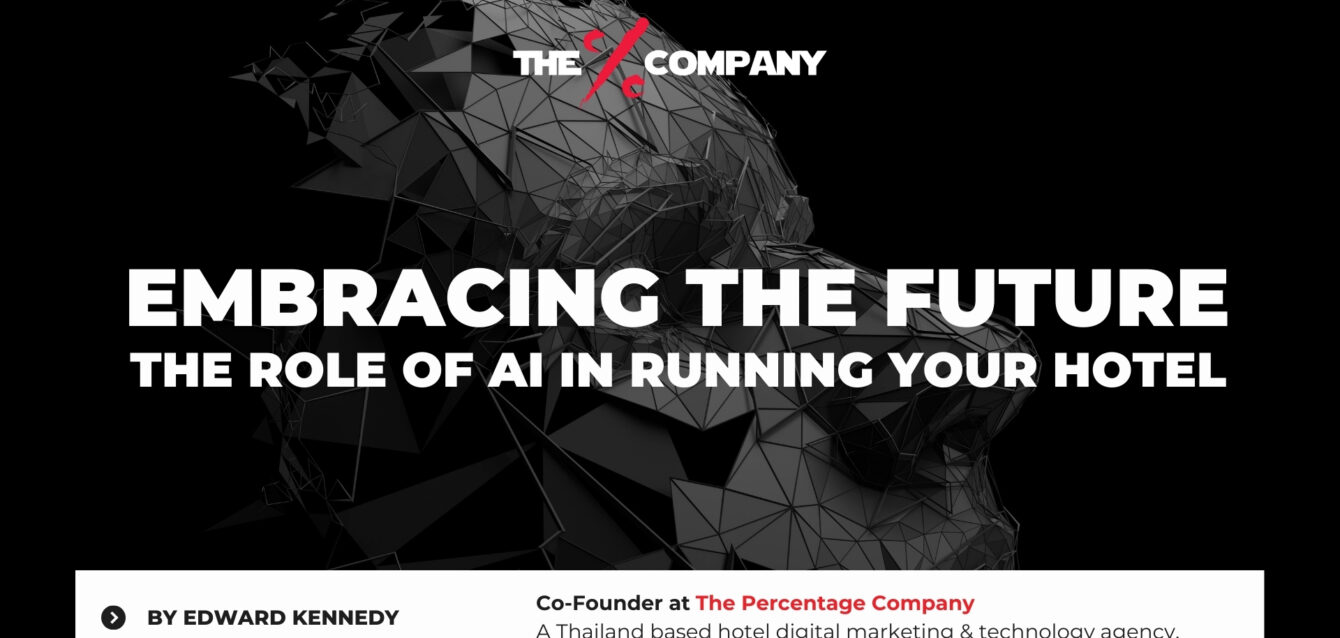The Percentage Company was delighted to have been invited to attend the Onyx Hospitality 2024 Annual Leadership Conference at the Amari Hotel in Pattaya and address over 100 of the Onyx Hospitality Groups senior management team on the subject of AI in hospitality. I gave a 30 minute presentation, and here’s my speech:
—
Good Afternoon Ladies & Gentlemen,
Welcome to this session on “The Role of AI in Running Your Hotel”. I’m thrilled to be here today!
My name is Edward Kennedy and I’m a techie and a hotelier. My first visit to Thailand was in 1989, but in 2007, I came to Phuket for a 2 week consulting project to redesign the hotel network and help upgrade from Fidelio to Opera at my friend’s hotel, The Meridien Phuket Yacht Club… My trip lasted longer than expected, I’m still here…

Since then, I’ve worked with dozens of large and small hotels in the IT, Sales & Marketing space and co-founded The Percentage Company. We’re a hotel digital marketing & technology agency based in Thailand and we provide a range of services focusing on improving sales performance and driving efficiency through technology.

Since 2018, we have provided software and services to over 600 hotels in more than 82 locations across the world…

SO! Enough about me. Hands up – – Who here has used AI before?

The answer is… All of you have used some form of AI in your daily life!
Artificial intelligence (AI) will have a profound impact on our industry and has the power to disrupt and transform our daily lives. Now, the term “AI” might conjure images of the Terminator’s Skynet or Agent Smith from The Matrix movies, but worry not! There’s at least 18 months before that happens…
As you will have seen, AI is everywhere now, it’s hard to buy a product without it mentioning AI. From AI toothbrushes to AI Shoes to AI Beer to AI Refrigerators (yes they’re a thing!) – AI can be used to help make our lives and jobs easier, and can become a force multiplier for your organization.
Today I’m here to discuss how AI could revolutionize your hotel operations going forward and I’ll try to explore some of the opportunities and challenges that AI will present in our industry.
I’ll also try to give you some practical advice for what you can do to get started now… or after the pool party that is….
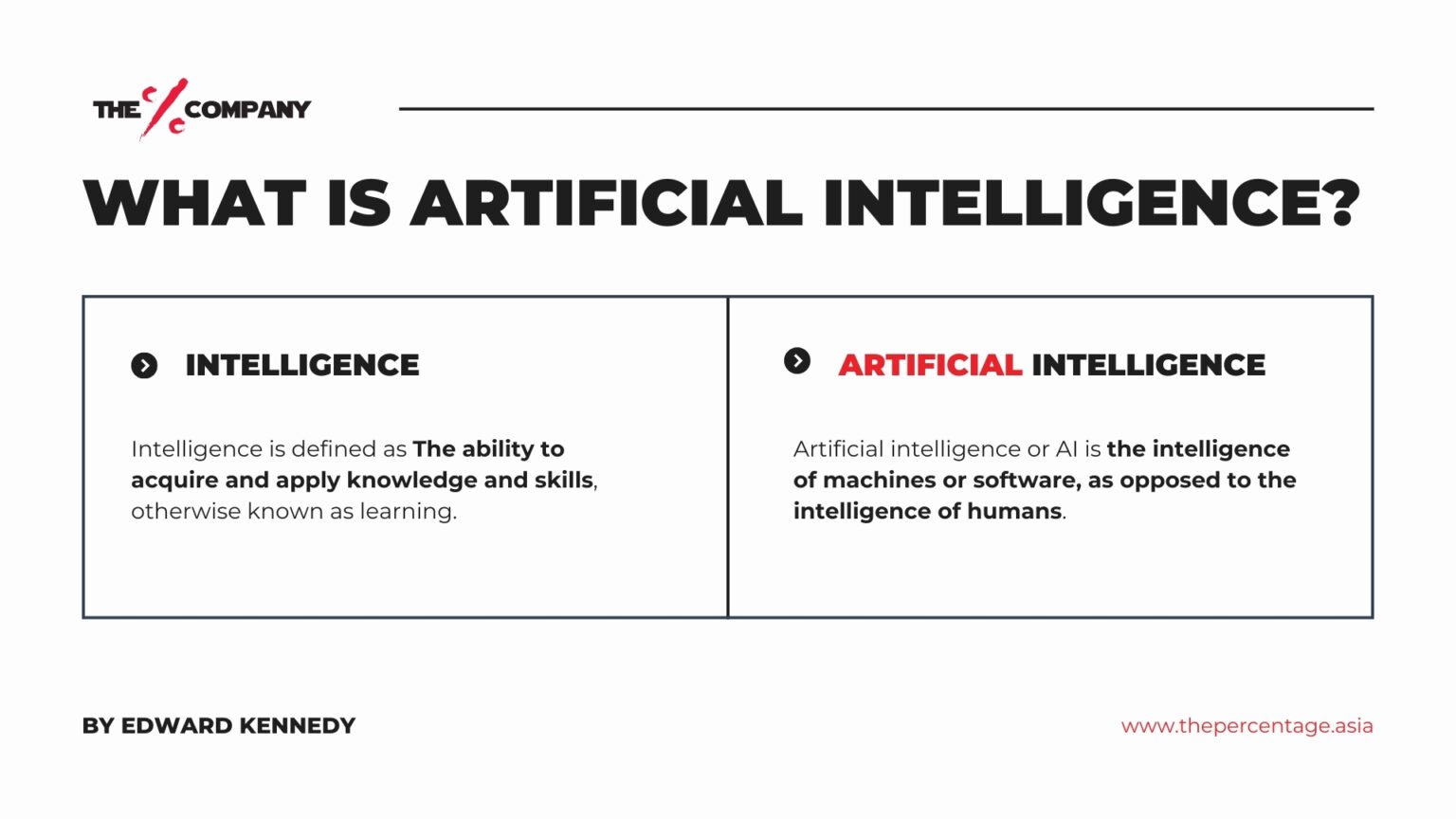
What is Artificial Intelligence (AI)?
Ok – Firstly, let’s start with the basics, what is Artificial Intelligence?
Artificial intelligence or AI is the intelligence of machines or software, as opposed to the intelligence of living beings, primarily of humans.
So at its core, AI is simply the discipline of making machines capable of mimicking or faking intelligent behavior. In even simpler terms, it’s about making computers think and learn like us humans.
AI software in its current form, is designed to analyze huge amounts of data and make data-driven decisions based on the results of its analysis.
AI tools can sift through mountains data and identify trends and patterns in seconds which would otherwise take a human a huge amount of time to see. Based on its analysis, it could then recommend taking certain actions, make predictions and even provide forecasts. More about this later.
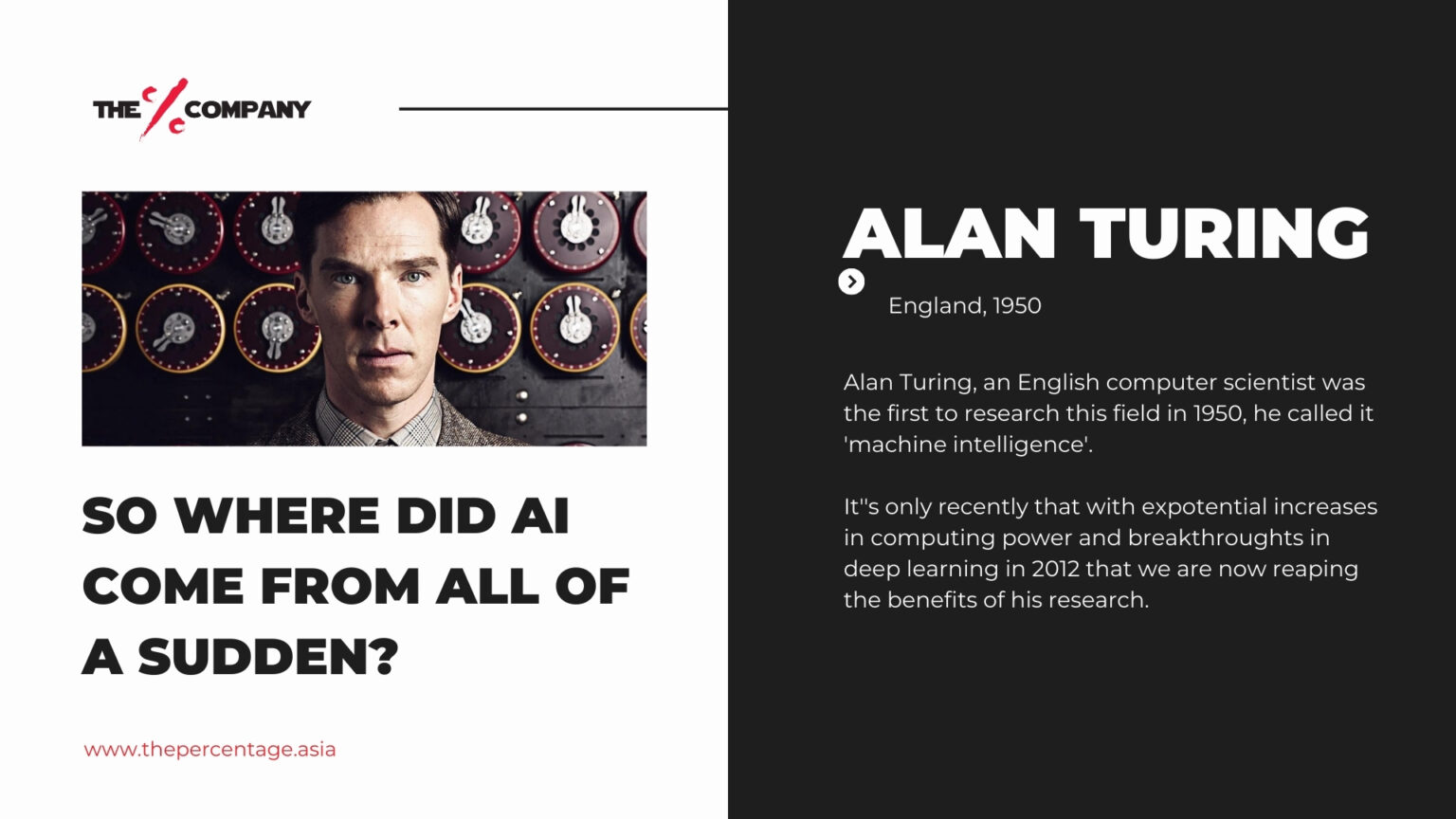
So where has AI come from all of a sudden? Well AI is actually older than you might think. Alan Turing – who was played by Benedict Cumberbatch in The Imitation Game Movie – was the first to research this field in 1950. He called it “machine intelligence”.
It’s only recently that with the exponential increase in computing power and breakthroughs in something called deep learning in 2012, that we are now reaping the benefits of his research.
AI is made possible by over 86 years of continuous and exponential growth in computing power. Through world wars, natural disasters and even Covid, computing power has continued to grow, exponentially.
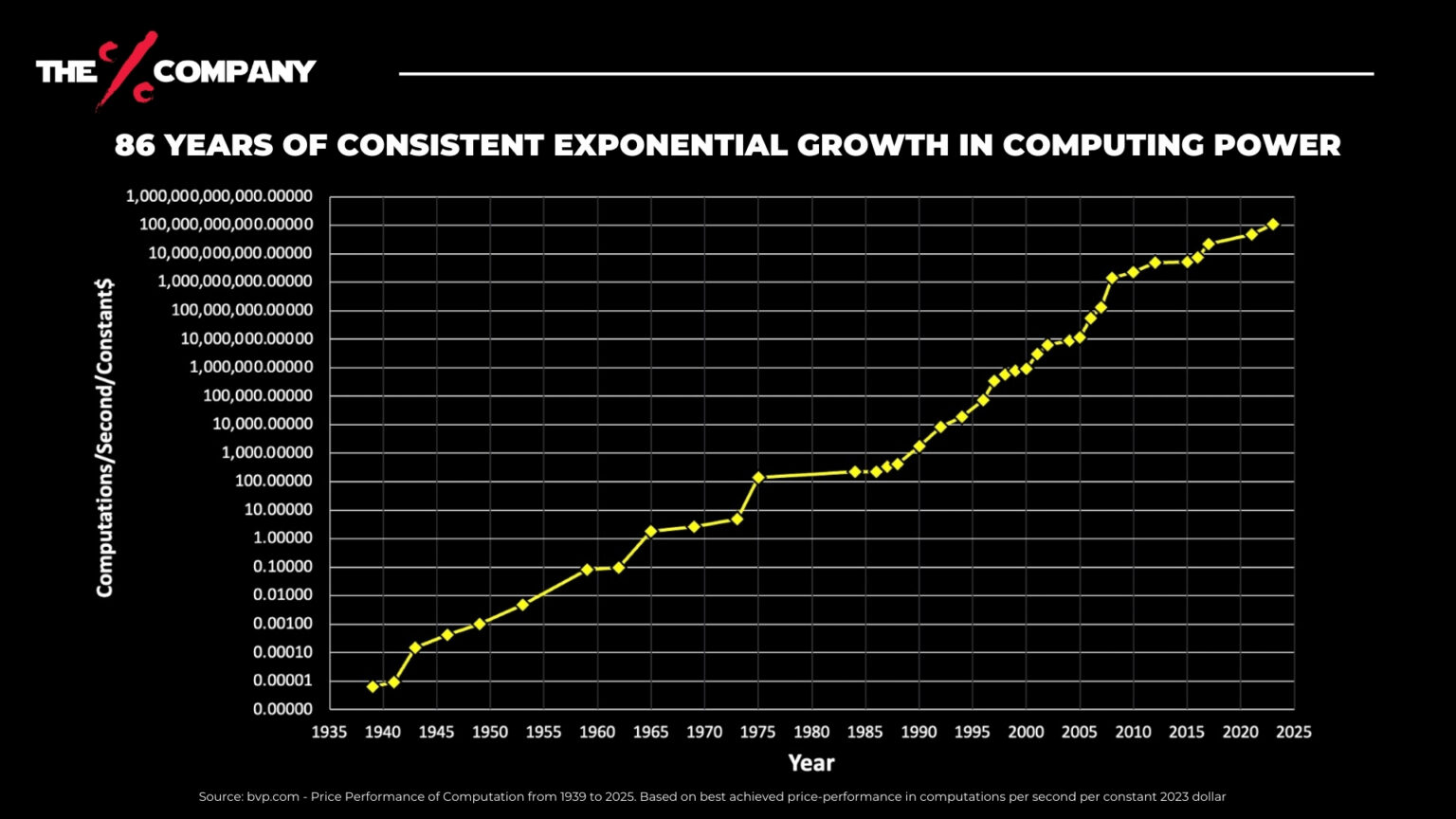
To put this into perspective (if that’s possible) – Since 1939, computing power has increased about 20 quadrillion times and it’s not slowing down.
This graph shows that the power of AI will continue its trajectory and will continue to grow exponentially, meaning AI is likely to have a far greater role in our lives and in our industry going forward.
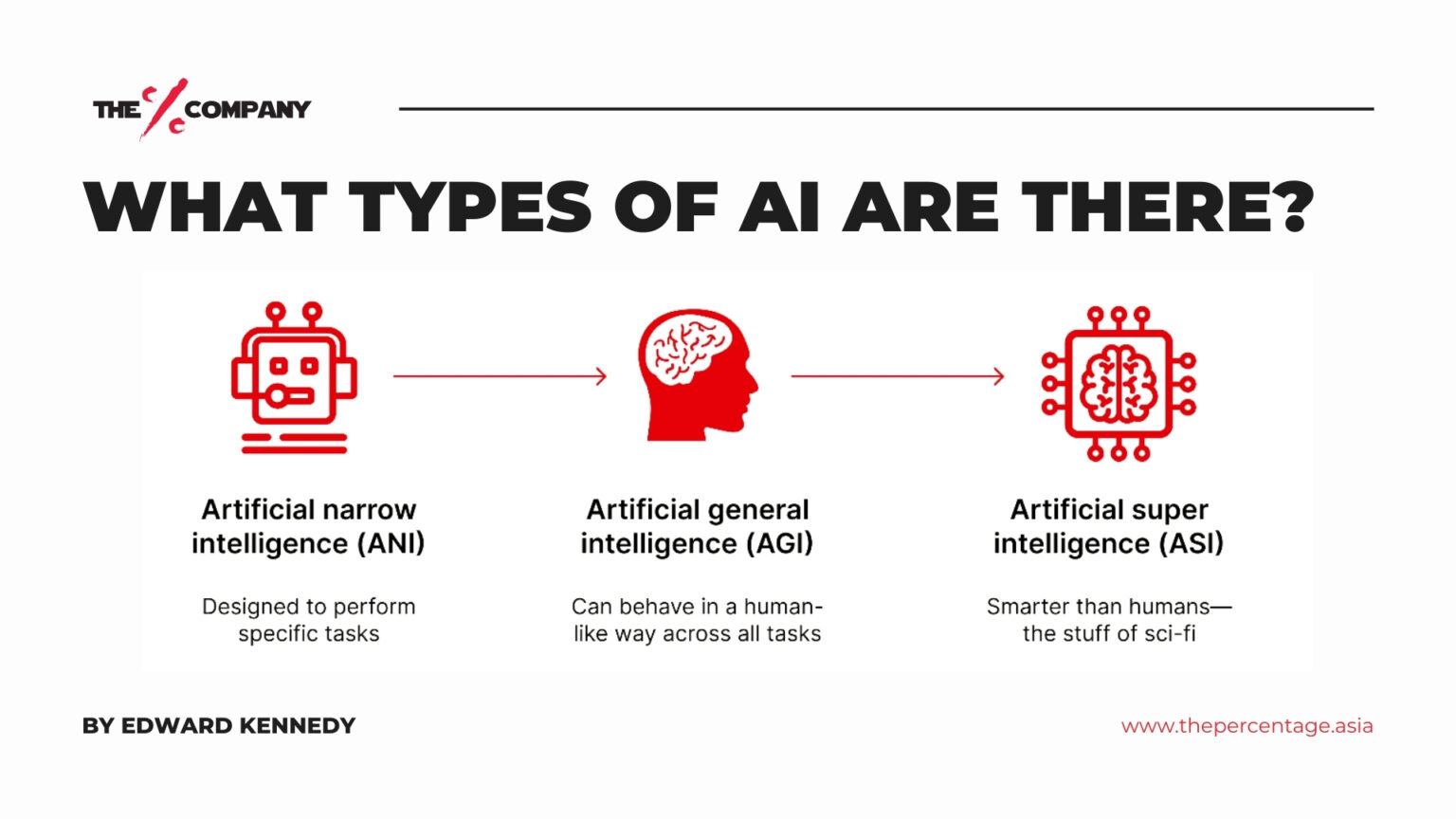
What types of AI are there?
As I’m sure you know, AI is now everywhere, and is used throughout industry, government, and science. So i think it’s useful if we first look at the 3 general types of AI:
1. Narrow AI
Narrow AI is the most common type of AI we see today. Generative AI or conversational AI are subsets of this and it simply means a tool designed to perform a specific task very well.
Narrow AI can be used to create new things like text, images or even code, but it can’t apply its knowledge to other problems and normally doesn’t learn or adapt on its own. Some high-profile examples are:
- Netflix & Spotify who use AI to personalize your movie & song recommendations.
- Most Airlines use AI to dynamically adjust rates based on real-time demand.
- Tesla Self Driving cars use AI to get you home safely
- And tools like ChatGPT or Google Gemini can help you write speeches for big presentations in Pattaya…
2. General AI
General AI or AGI (Artificial General Intelligence) is a hypothetical type of AI that would theoretically be able to perform any intellectual task that a human can and for the results to be indistinguishable from that of a human. This is known as the Turing test, but this type of AI doesn’t exist yet.
3. Super AI
Super AI is also hypothetical, but it’s an AI that would surpass human intelligence in all aspects. Super AI is the Terminator style stuff of science fiction, and there’s no way to know when or indeed IF, it might be developed.
So how does Narrow AI work? I’ll try not to get into the weeds here, but put in its simplest terms, AI completes tasks using 3 steps:
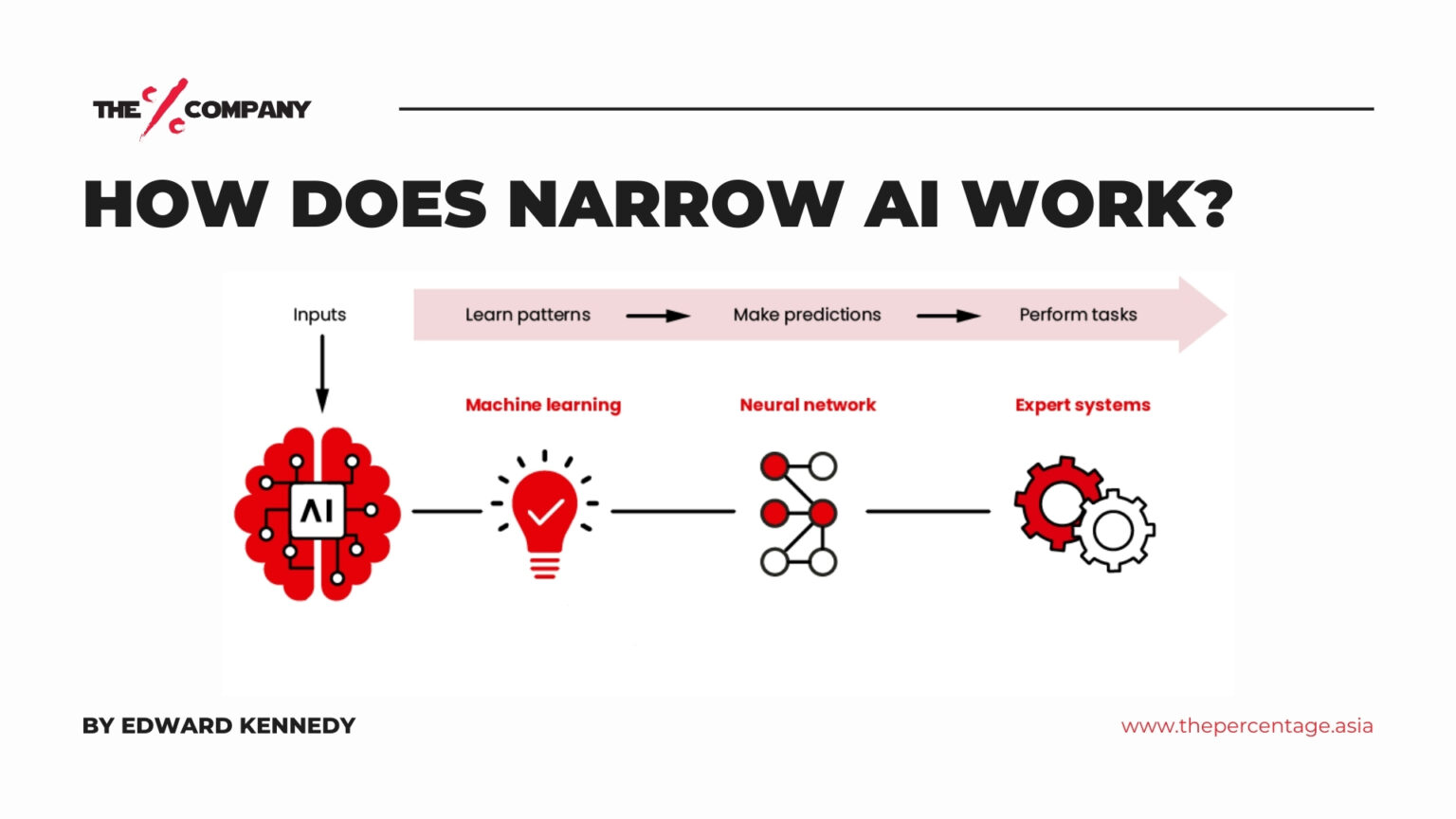
- Using something called machine learning or deep learning It learns patterns.
- Using neural networks (which means language & speech recognition) It makes predictions
- Using data processing & distribution It performs tasks
Are you still with me?
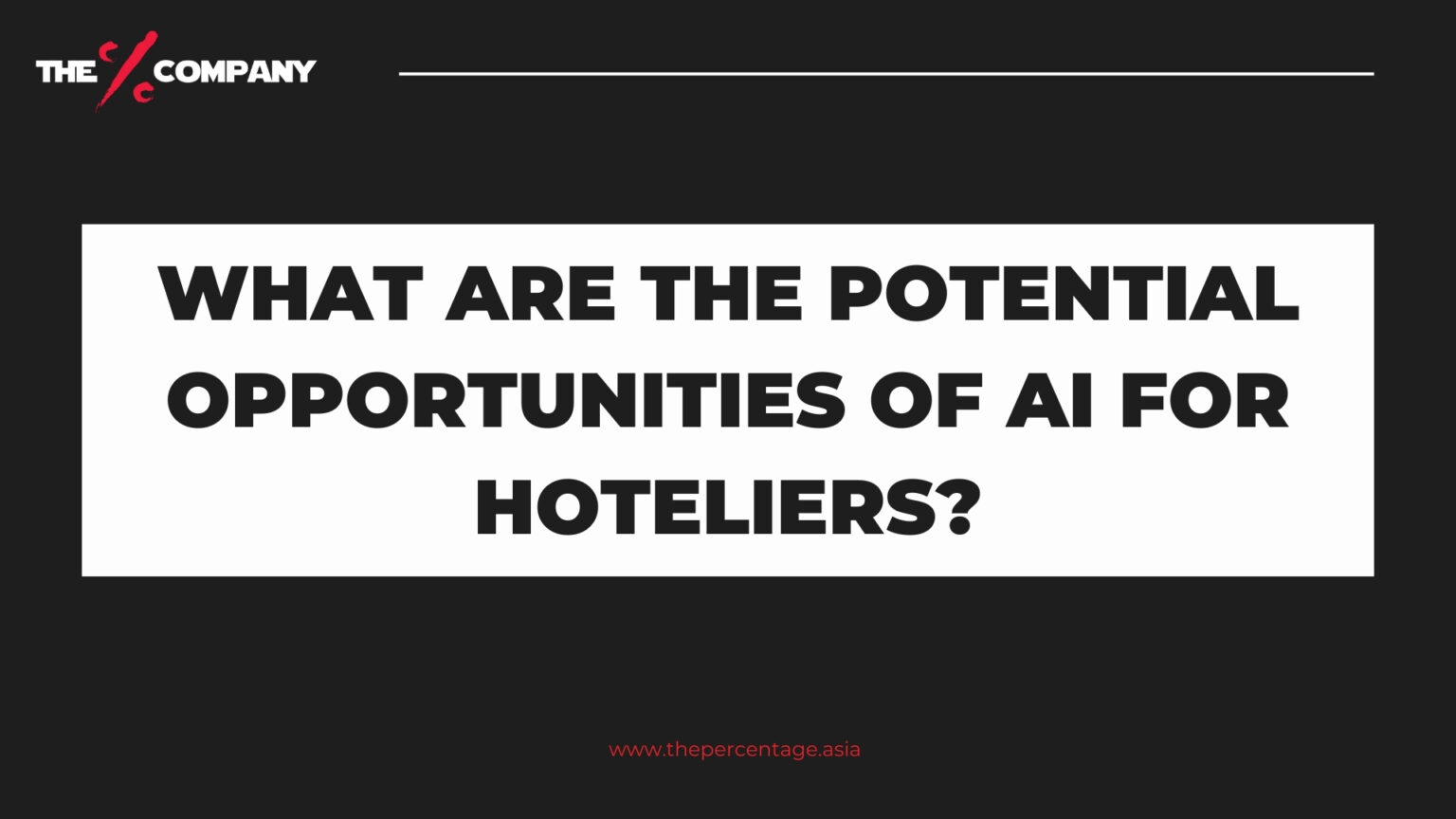
What are the potential opportunities of AI for hoteliers?
So let’s dive in and look specifically at the hospitality industry. What are the potential opportunities for us as hoteliers?
As mentioned, AI is still limited in its scope and functionality, but does have the potential to add value now and be transformative going forward when it comes to improving guest experience and freeing up staff to focus on giving that special human touch. Here’s some of the key areas where AI could make an impact:
1. Streamline operations & reduce costs
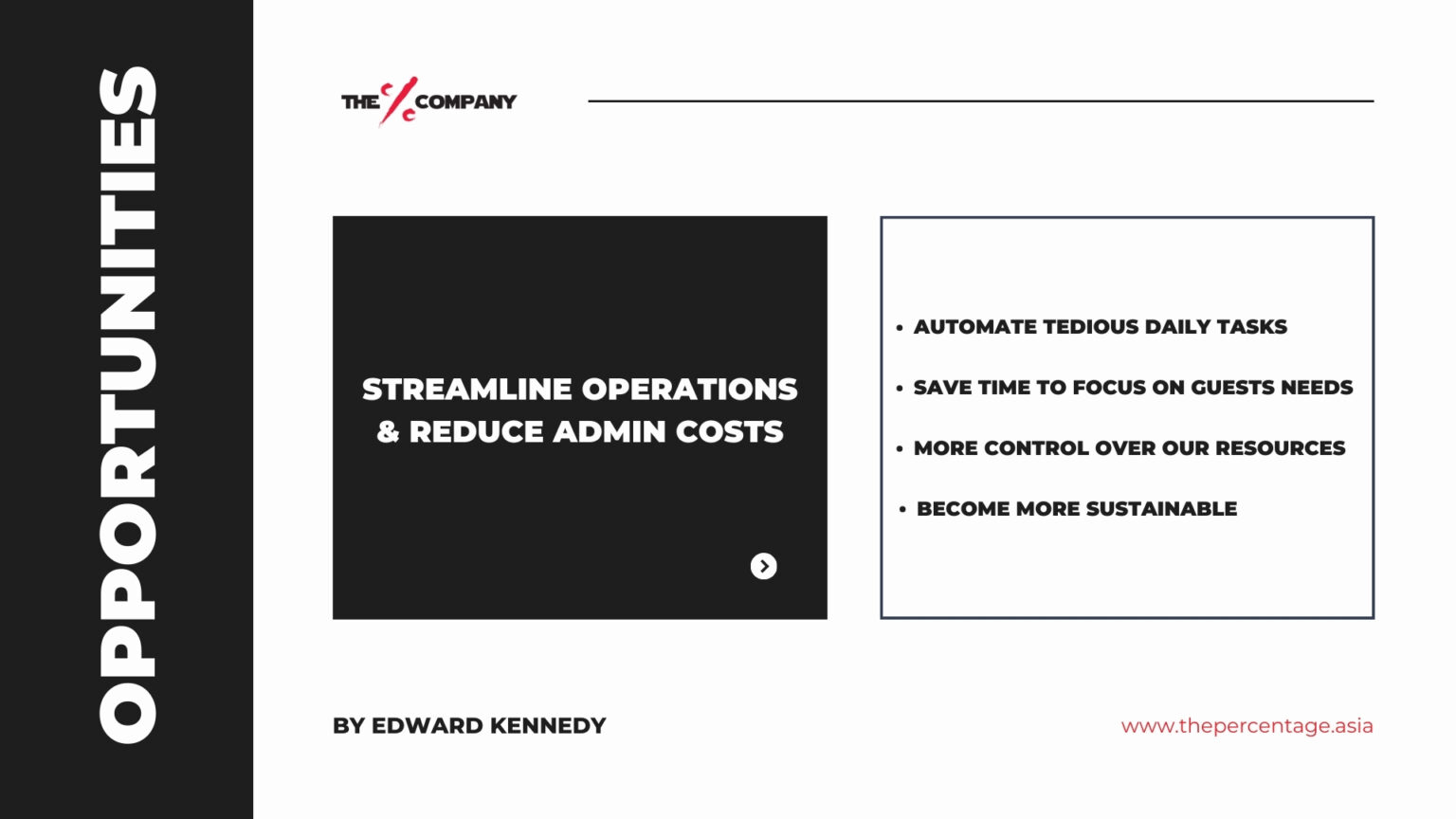
AI powered systems can help streamline operations & reduce costs by automating some of the more tedious daily tasks such as answering reservation enquiries, taking room service requests, check-ins, and check-outs which would reduce the workload on your team.
There’s a lot of advancement in AI Chatbots or digital concierge tools which are now able to interact with your guests 24 hours a day in multiple languages. The next evolution of this will be AI powered recommendation engines which would then be able to predict your guests preferences and anticipate their needs before they even articulate them.
Smart systems are already common in hotels but we can expect further advancements in predictive air-conditioning, lighting and power consumption optimization. AI, when combined with your HR platform, could even be used to streamline housekeeping schedules to ensure that rooms are cleaned just in time for arrivals, which would help your hotel become more environmentally sustainable and ultimately more cost-efficient.
2. Advanced Insights into our guests
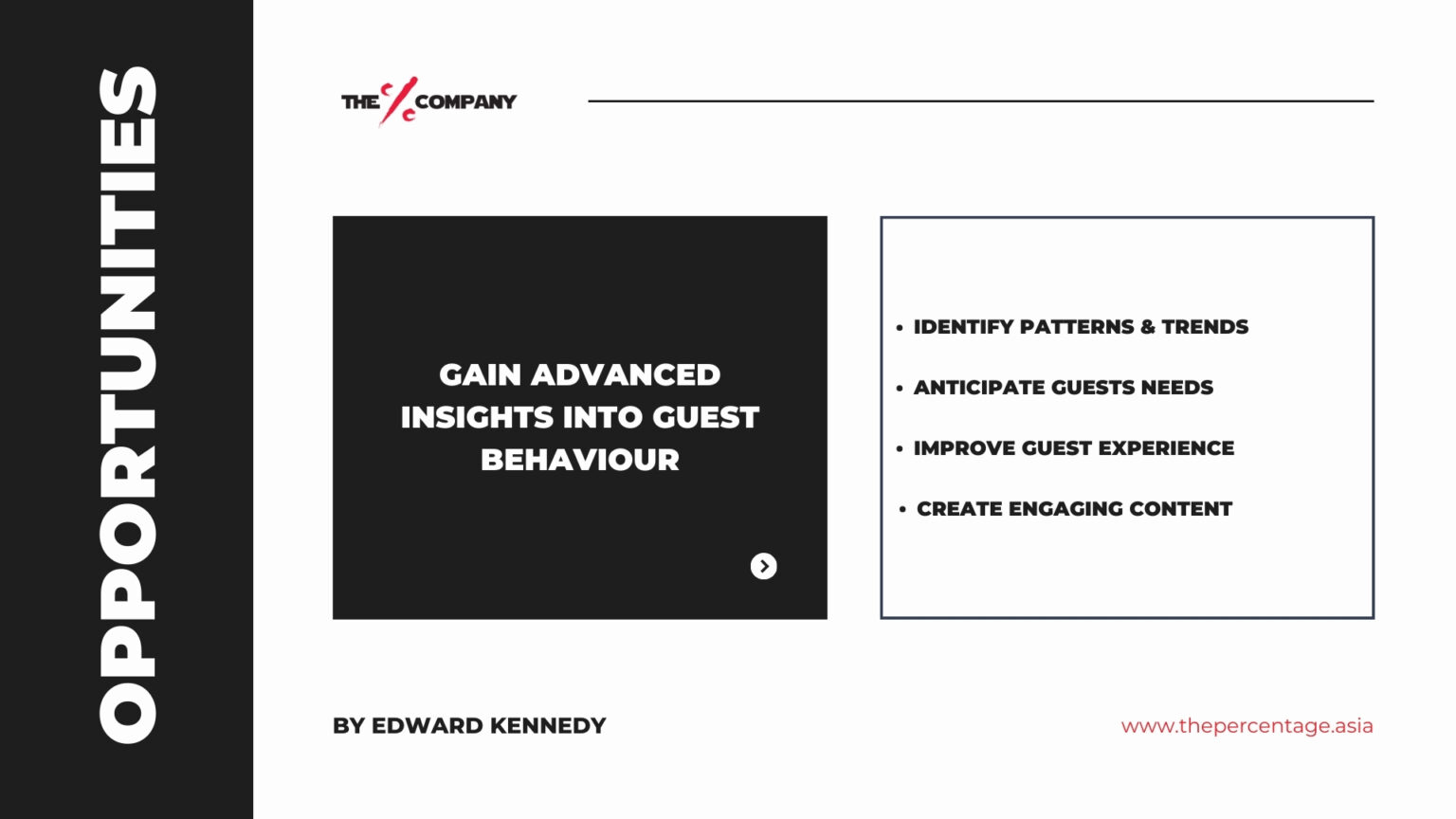
AI-driven marketing tools will be able to provide advanced Insights into our guests and support omni-channel content creation for your marketing teams, leading to improved communications and sales. By analyzing guests data, AI algorithms will be able to identify patterns and trends, enabling hotels to create extremely targeted and personalized offers for each individual guest. Once guests arrive, these tools will then be able to create customized guest experience offerings that are most likely to convert.
Hotels will be able to anticipate guest needs and preferences, and use them to personalize every aspect of the guest’s stay leading to increased guest satisfaction and ultimately an increase in return guest ratios. This data can then be used to create amazing content such as blog posts, slogans, social posts and more to build that all-important direct engagement to help reduce guest acquisition costs.
3. Allow more efficient Hotel-level Resource planning
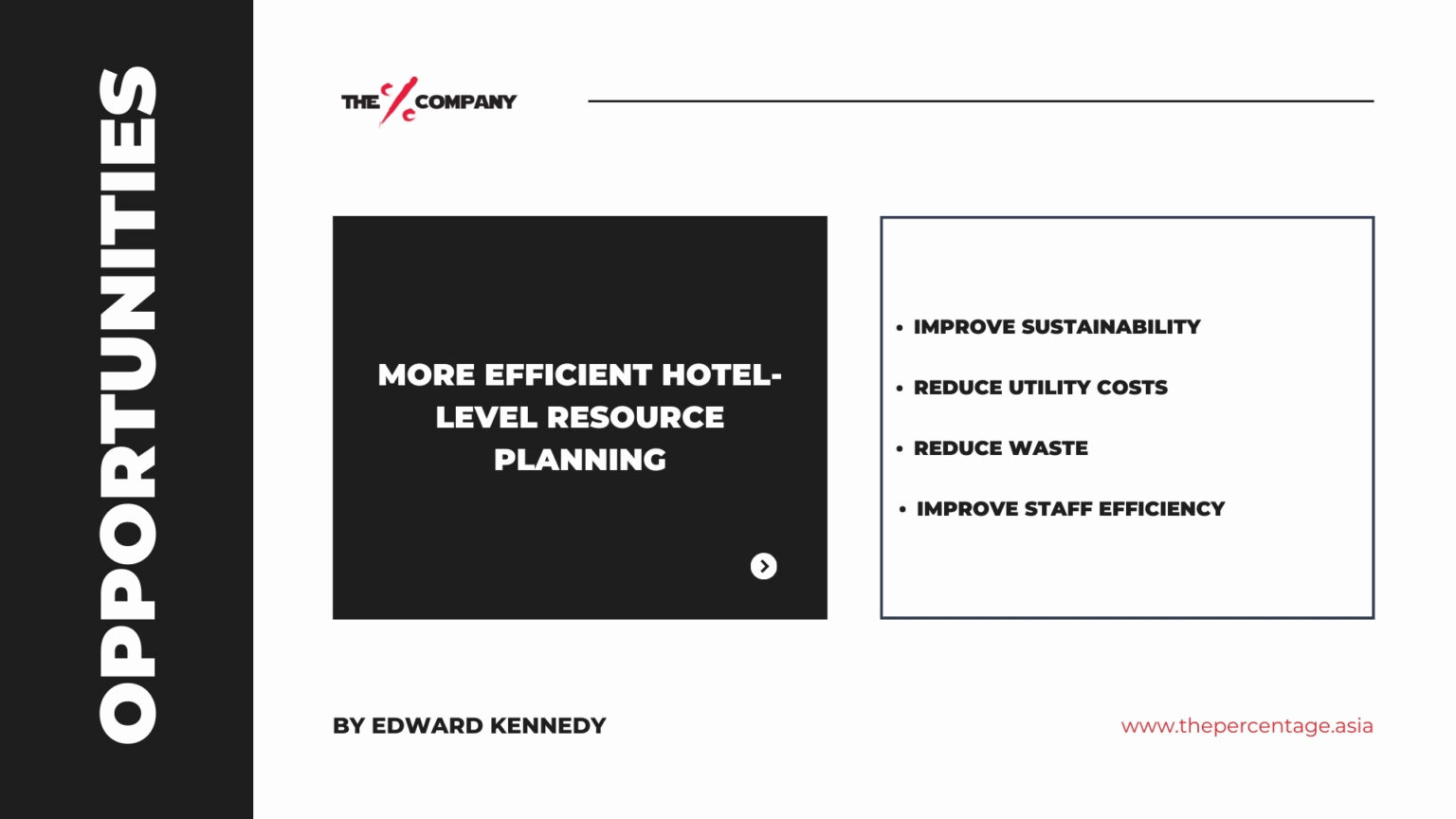
AI will be able to allow more efficient Hotel-level Resource planning, in areas such as reducing waste and improving hotel-level sustainability.
We can expect further advancements with AI powered energy management systems which will be able to monitor and optimize energy consumption in real-time by adjusting lighting and temperature setting automatically. This will not only reduce utility costs, but will also help minimize the hotel’s carbon footprint and make the hotel more sustainable. AI algorithms will even be able to optimize inventory management, predict demand for supplies and minimize waste by ensuring optimal stock levels.
By using AI to optimize resource utilization across the organization, we could free up staff time to focus on what truly matters – creating exceptional guest experiences and delivering high-touch personalized interactions with guests.
4. More informed decisions about their operations more quickly and more accurately
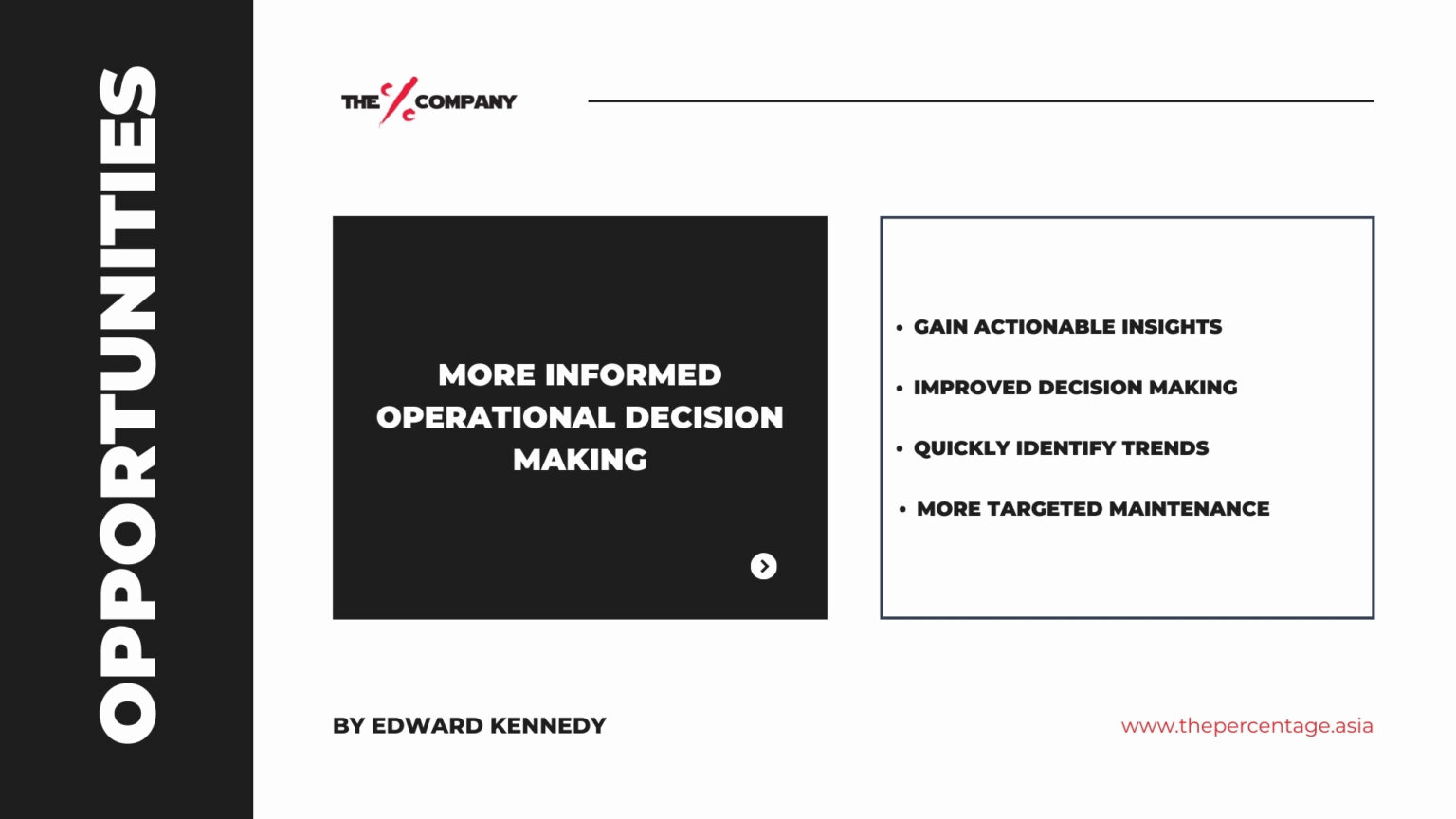
AI will have the ability to process vast amounts of data and generate actionable insights in moments, which will empower GM’s & HOD to make more informed decisions about their operations more quickly and more accurately. Translate those AI-driven insights into actionable steps that can improve your processes, inform your decisions, or solve your problems.
Advanced AI-powered analytics and business intelligence tools will be able to analyze and aggregate data across multiple sources, including guest feedback, online reviews, and operational KPIs and metrics, to identify areas of improvement and detect trends we may otherwise not notice.
This would enable the management team to make more data-driven decisions regarding manning, service quality, investments and maintenance, leading to more efficient and effective operations.
5. Allowing more efficient & proactive revenue management
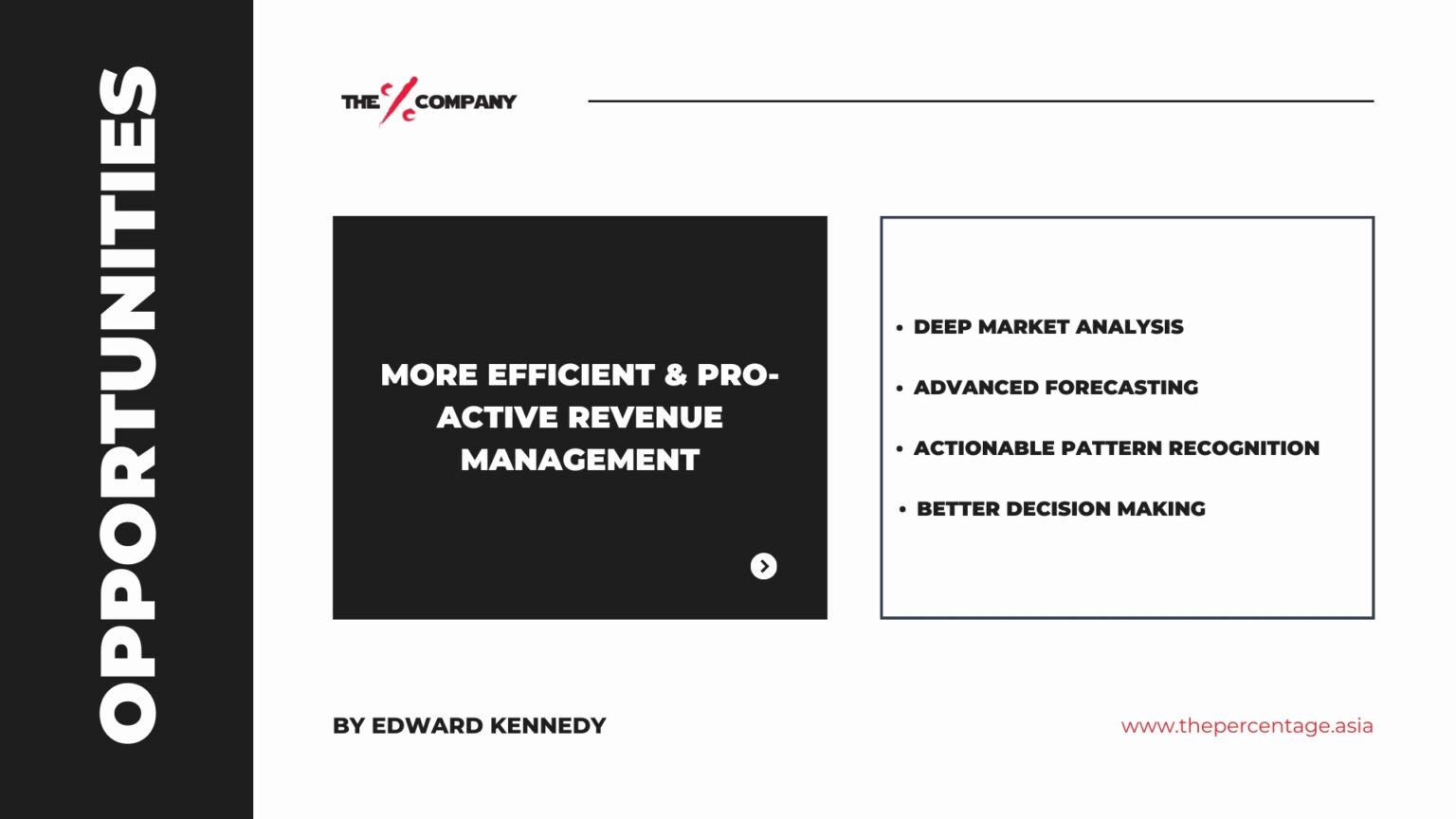
As you’ve heard earlier today from your esteemed colleague, AI will play a crucial role in allowing more efficient & proactive revenue management by analyzing market trend data, flight information, competitor rates, weather forecasts and historical data. AI algorithms will be able to accurately predict/forecast demand patterns and recommend dynamic pricing strategies in real-time.
This will give revenue managers all the necessary actionable insights and data at their fingertips to make the right decisions at the right time based on factors such as seasonality, occupancy levels, and market demand, ensuring competitiveness while maximizing profitability. The early bird adopters and more forward thinking properties will undoubtedly get the worm.
6. Enhance guest safety and security
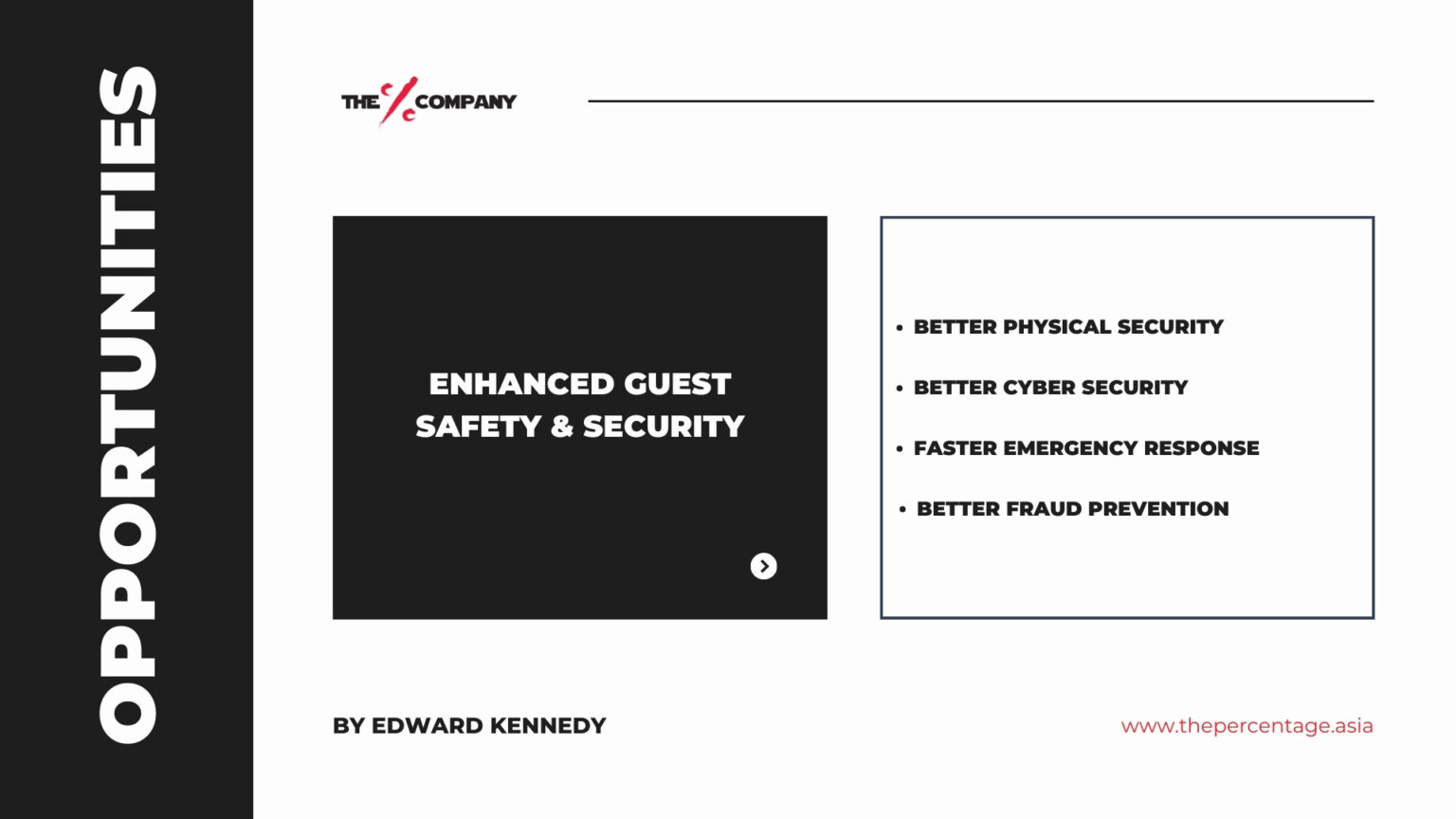
As you know, the safety and security of our guests is always paramount and AI will be able to enhance guest safety and security.
Security camera systems will use facial recognition technology and monitor video feeds in real time to enhance physical security and allow easy check-ins while ensuring the safety of guests and staff, alerting us of suspicious activity.
AI will even be able to detect anomalies in guest behavior or in-room sensors to prevent accidents and improve emergency response times.
But not all is in the future – payment processors like our partner Stripe are already able to analyze and mitigate the risks of credit card fraud using AI and there are some amazing advancements in AI for cybersecurity.
7. Improve staff training and assistance

AI could also be used to support and improve staff training and assistance by providing more interactive SOP’s, training resources and simulated scenario testing to ensure that you are keeping your standards high.
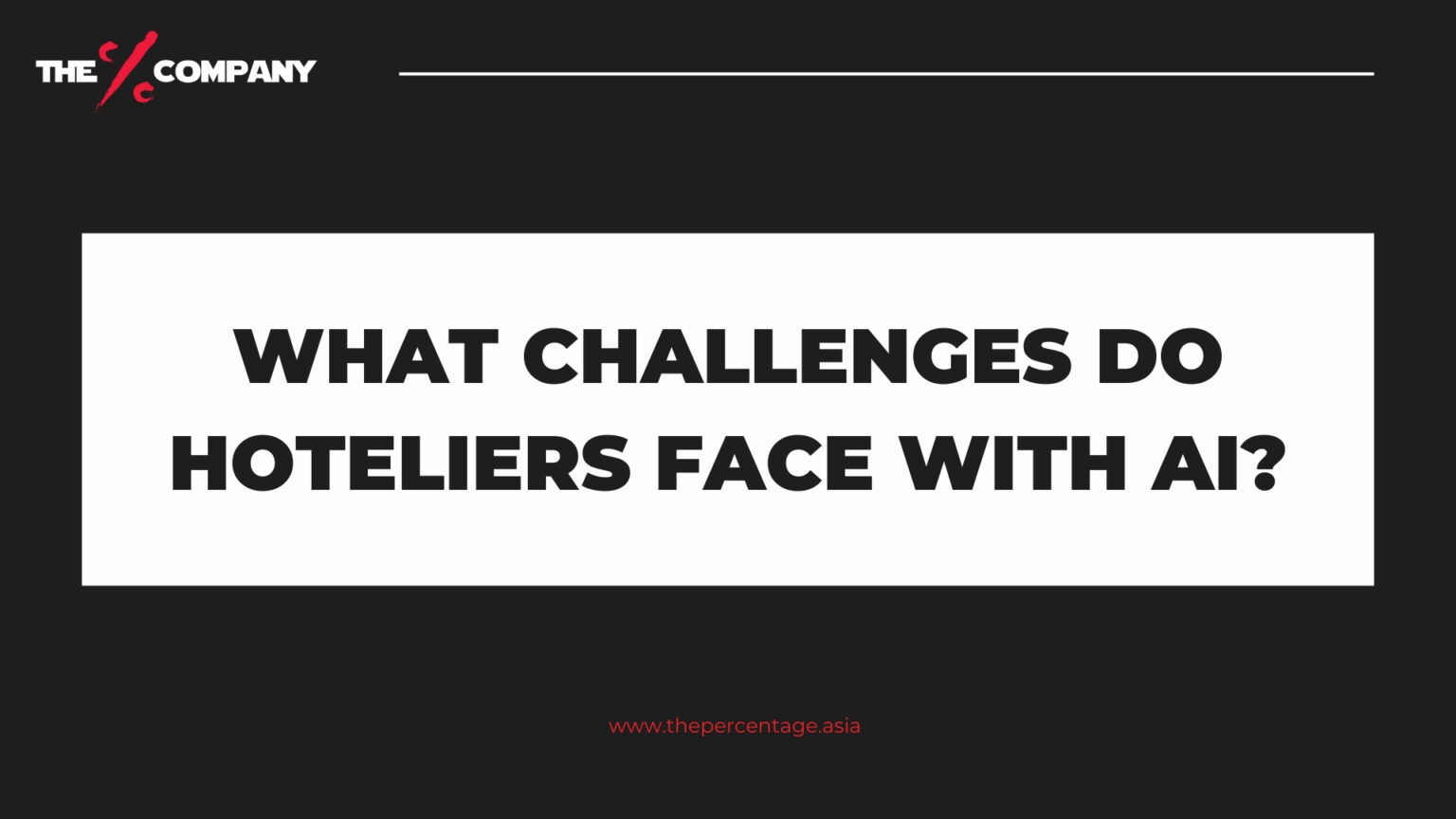
What challenges do hoteliers face with AI?
Existential risks aside, whether we like it or not, there are undoubtedly some challenges that AI will present us as hoteliers and here are some of the key issues to be mindful of:
1. Data security & Privacy
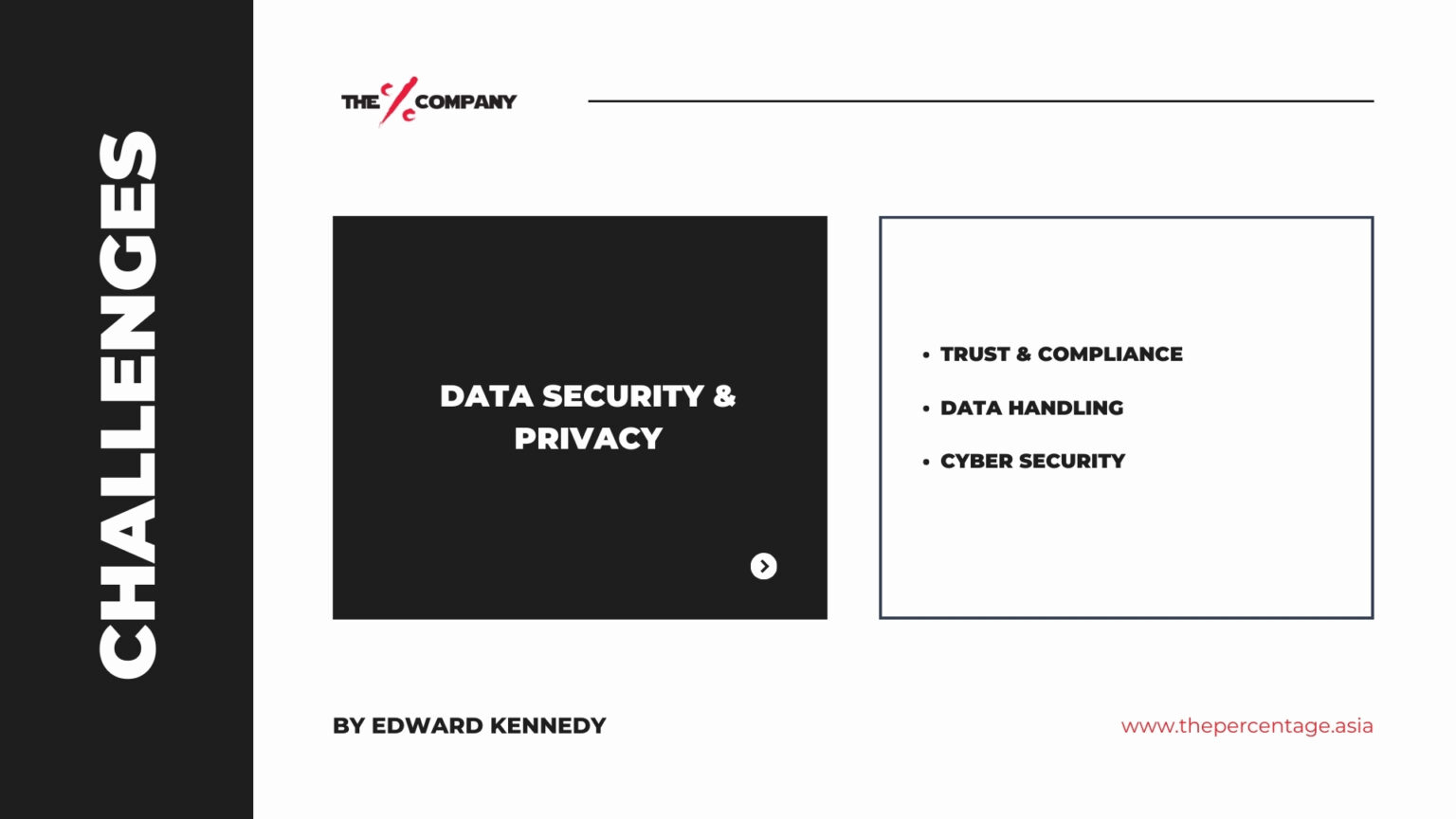
As I mentioned, AI relies on vast datasets to be effective. This means that Privacy of guest data will inevitably be a challenge for hoteliers going forward. We will need to address these guest data privacy concerns to ensure that we maintain trust and compliance in our industry.
As we inevitably get more access to more guest data going forward, we also need to have the right cybersecurity systems, protocols and processes in place to protect our guests’ data also. Security Audits, threat detection and avoidance systems, encryption, and training staff on data privacy and security best practices will be essential not only to keep that trust but also to comply with GDPR and data protection laws.
2. Ethical use of AI
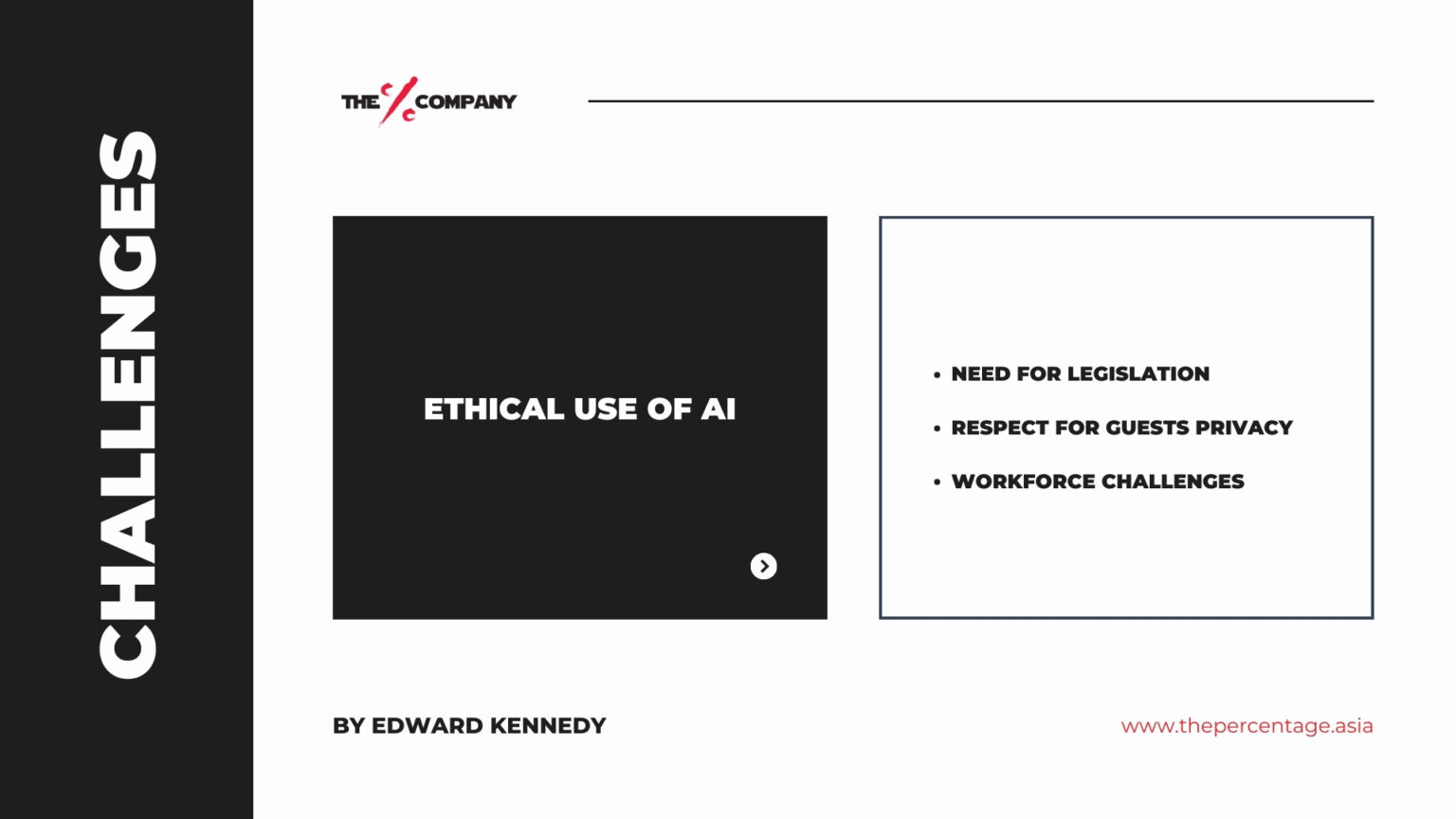
Somewhat related to my previous slide, Ethical guidelines for AI usage will need to be developed – possibly at government level – to ensure those unscrupulous techies don’t take advantage and that our guests’ privacy is respected. But from our perspective, this also means selecting and using AI tools that are designed with privacy in mind and can operate with minimal personal data.
There may well be some ethical considerations relating to AI and its potential to replace some human jobs, but in my opinion, we should see AI as a tool to make our lives easier and to improve the guest experience, not to devalue the human element, which is so vital to the hospitality industry.
What’s my advice? Be transparent, clear and open with guests about how you collect, use, and store their data. Clearly communicate your privacy policies and obtain explicit consent from guests before using their data for AI-driven personalization.
3. Transparency consent & Control
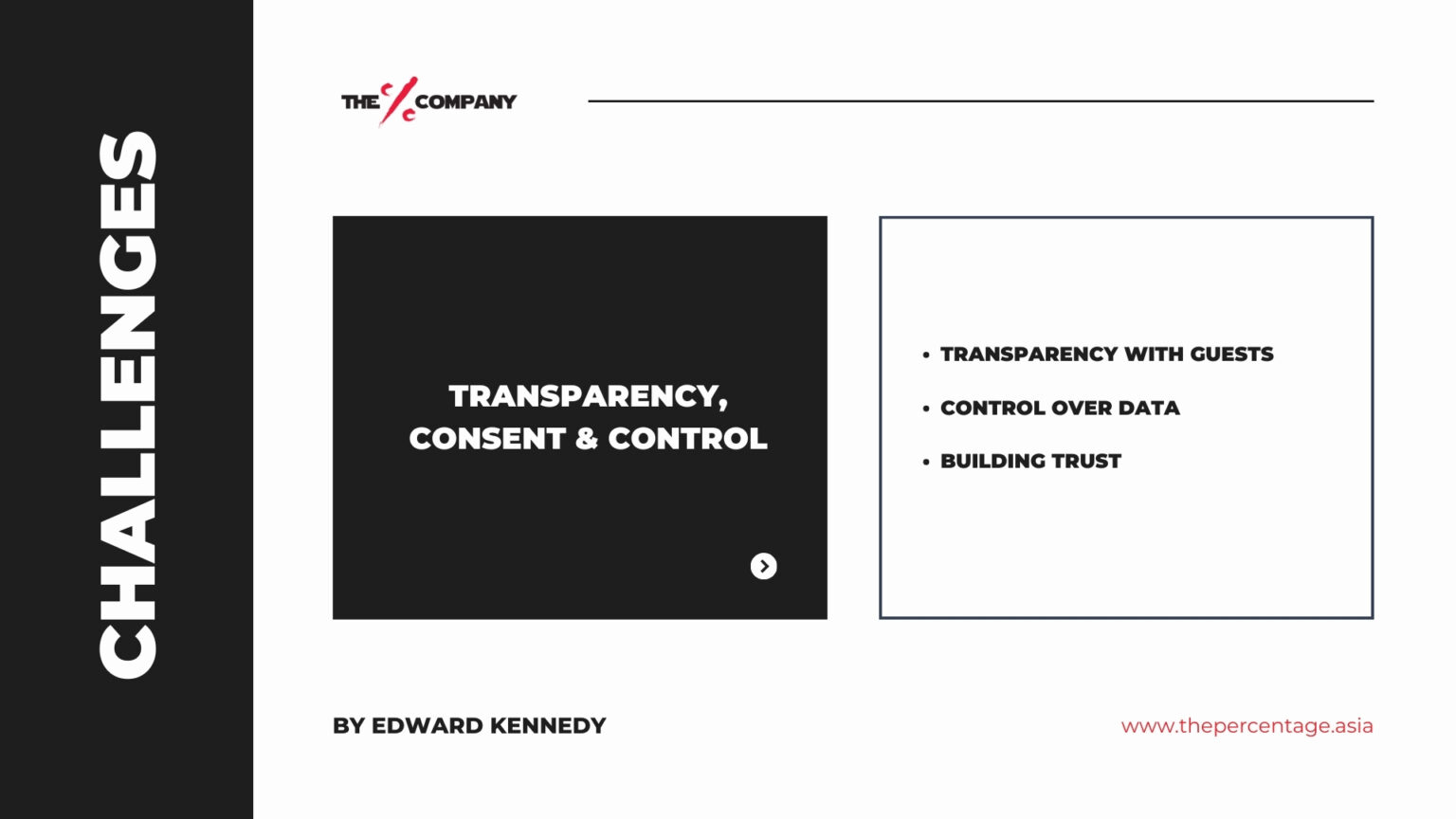
Guests should be given informed consent and control over the removal of their data and where possible be given the ability to access, review, and manage their data. This simple step would empower our guests to decide what information is used and to opt-out of data-driven services if they choose. By implementing these practices, we can address privacy concerns effectively and harness the benefits of AI while respecting guest privacy and building a foundation of trust.
4. Integration & Interoperability
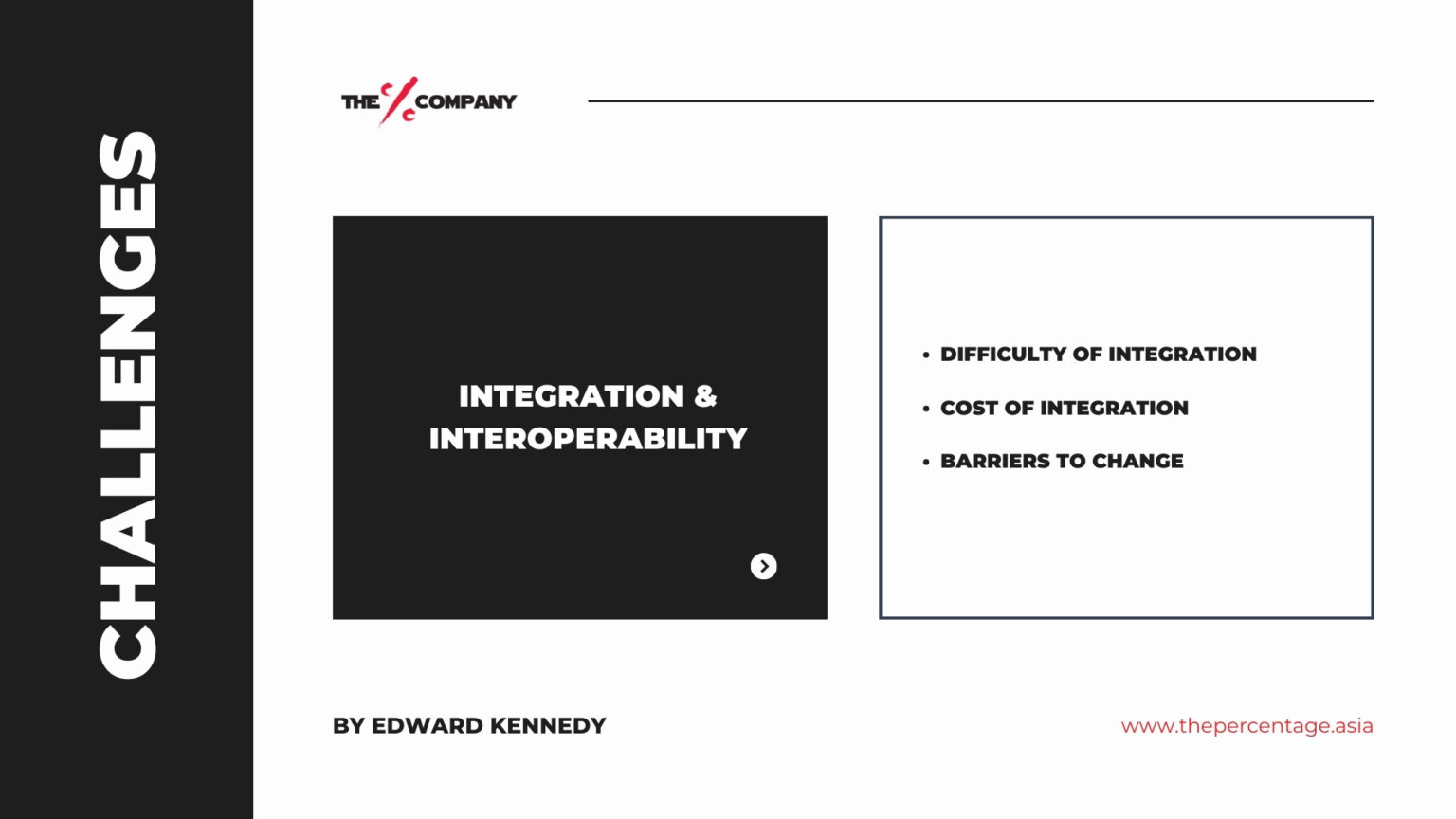
Speaking as a software developer, I can tell you that Integrating AI into existing hotel management systems will likely be very slow, complex and costly depending on the tech stack. It will certainly require financial investment but may also need a cultural shift within the organization over time. The team will need to be more agile in the tools that they use and adapt to new technologies as they come on-line.
5. Quality of data
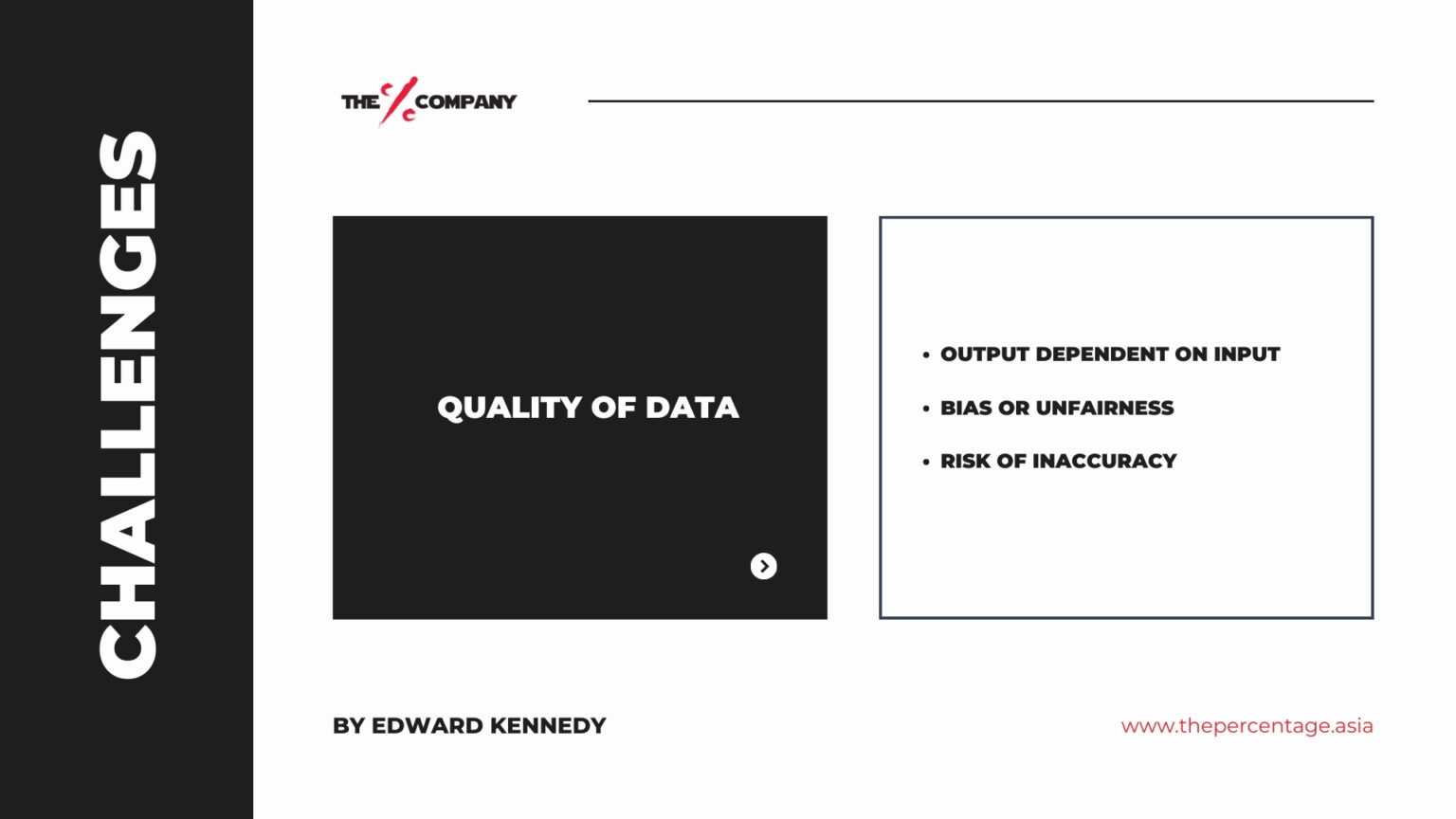
AI is only as good as the data it’s fed or put more succinctly, shit in / shit out.
Current generative AI tools like Chat GPT, Gemini, CoPilot and others gather intelligence from large language models and are therefore heavily dependent on the quality of the data it has access to. AI excels at identifying patterns, but it lacks human understanding of context and nuance. Human Expertise is Key, so we need to combine AI-generated responses with human expertise to transform raw data into actionable insights.
Tom Chatfield, an tech philosopher recently said “Forget artificial intelligence – in the brave new world of big data, it’s artificial idiocy we should be looking out for.”
Understand that bias or unfairness of that language model or even the coding can impact the results. We will need to be mindful of Inaccurate or biased data as it can lead to poor decision making and ultimately guest dissatisfaction. We will need to establish processes for collecting high-quality data and continually refining the AI algorithms.
6. Management of expectations
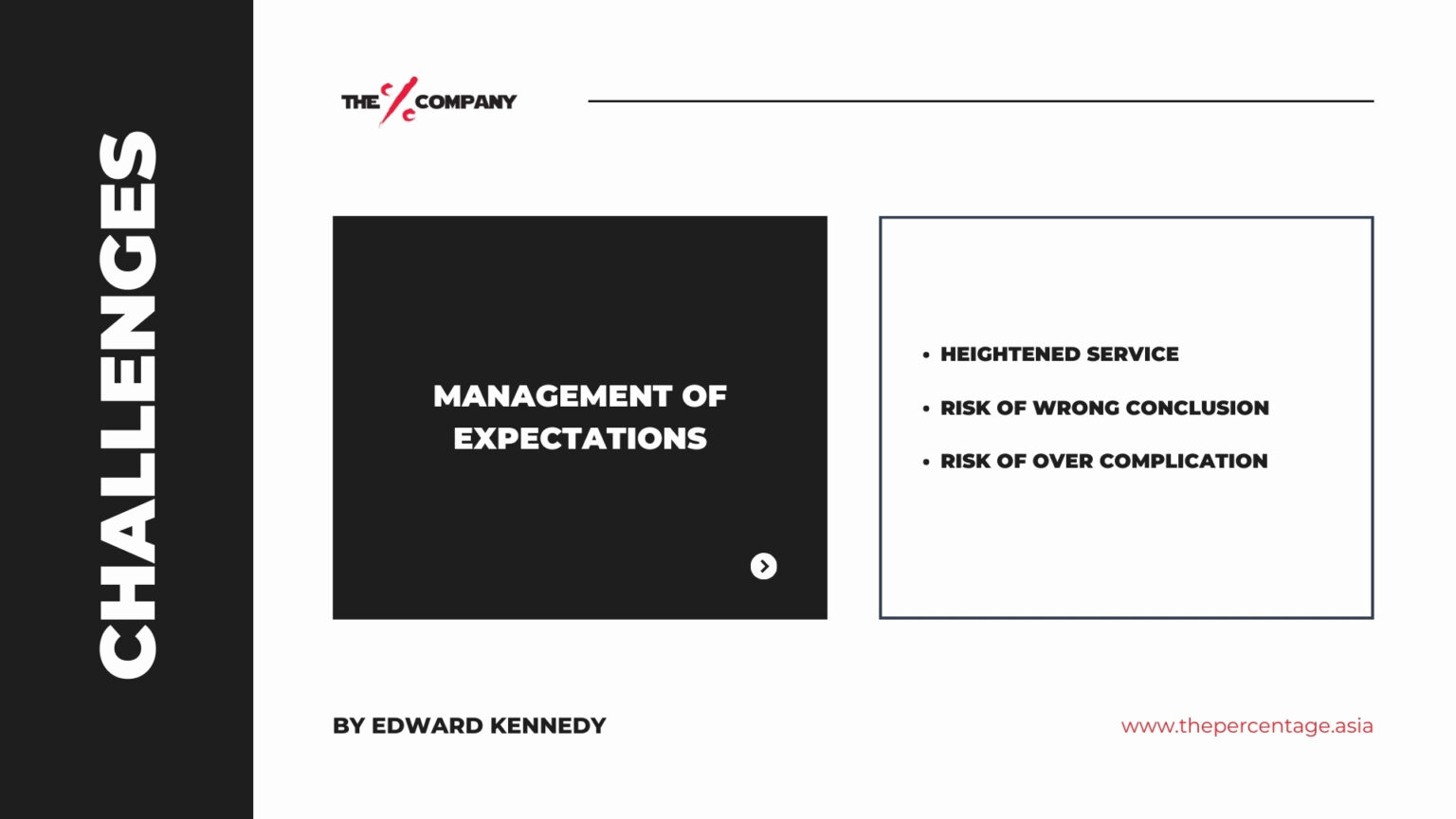
As AI becomes more prevalent across different industries, guests may well have heightened expectations for personalized and seamless experiences. We, as hoteliers, will need to manage these expectations and ensure that AI-driven services aren’t just there for show and that they truly add value.
7. Over-Reliance on AI
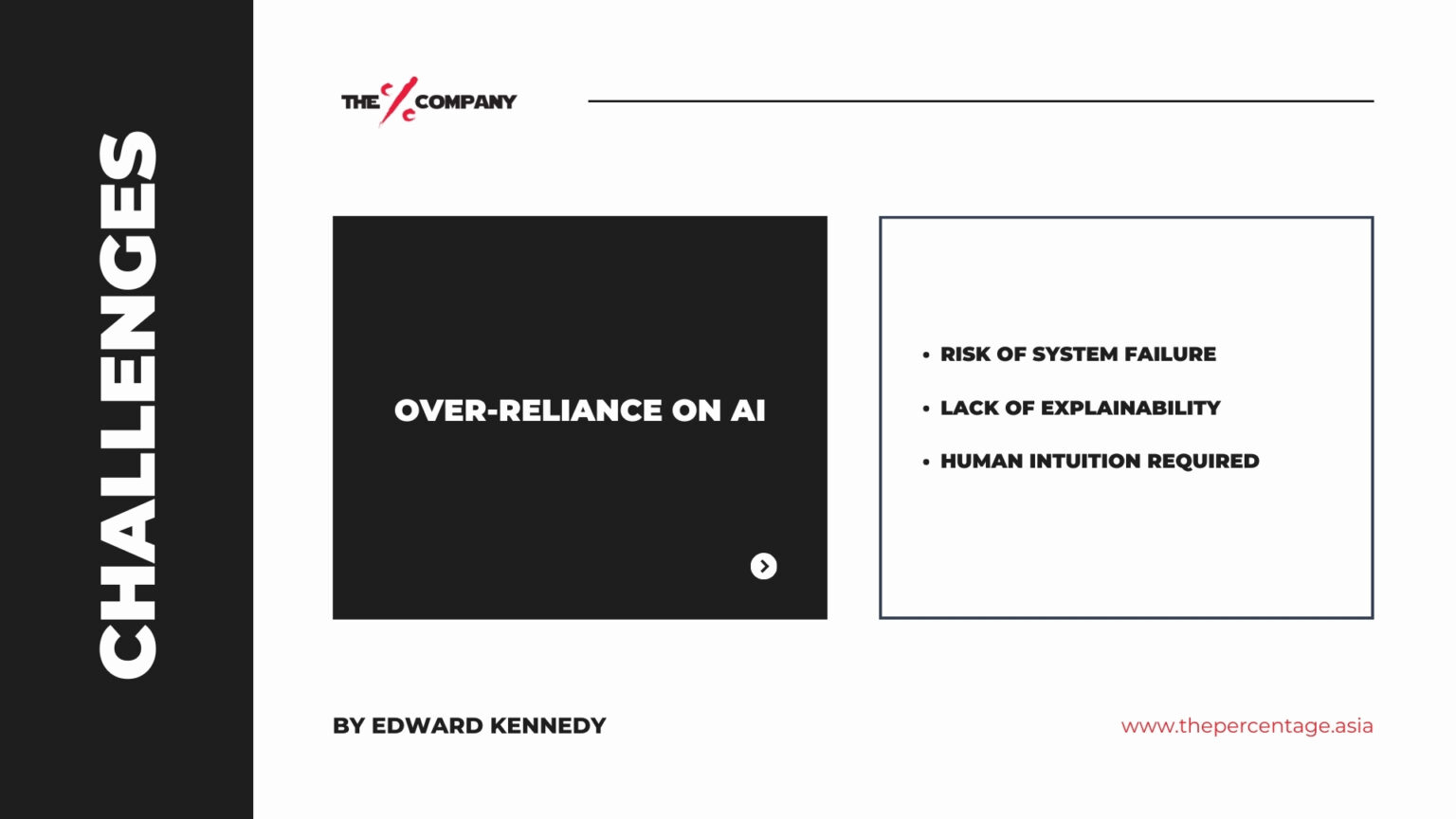
There’s a risk that if AI systems really take-off in our industry that we become too reliant on AI, which could be problematic if systems fail or if guests prefer human interaction. We do need to maintain a backup plan and a level of service that doesn’t depend solely on technology. Inherently there’s a lack of explainability with AI systems as they operate to a certain extent as a black box making it hard to reverse engineer their decision making processes in order to debug them. A human take on the outputs really is valuable.
8. Keep pace with new technology
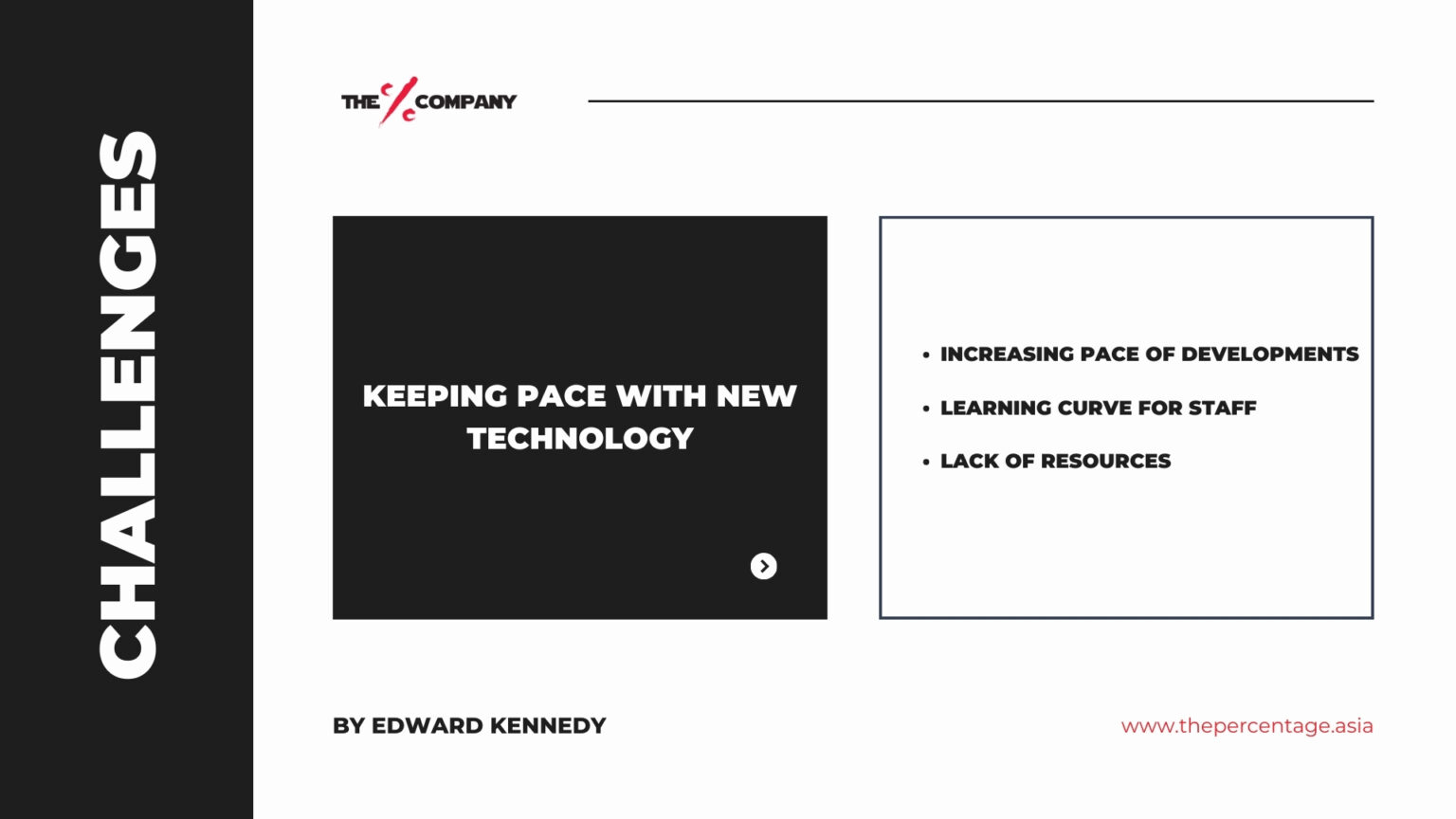
The pace of AI development means that we must be agile and be ready to learn and adapt to keep up with the latest technologies. This can be a challenge, especially for smaller operators with limited resources. I guess 1 top-tip would be to use outside resources to help – I can think of at least 1 company based in Thailand who’s good at that!
Once we acknowledge these challenges, we will be able to implement strategies to mitigate the risks in our industry and better prepare for what lies ahead.
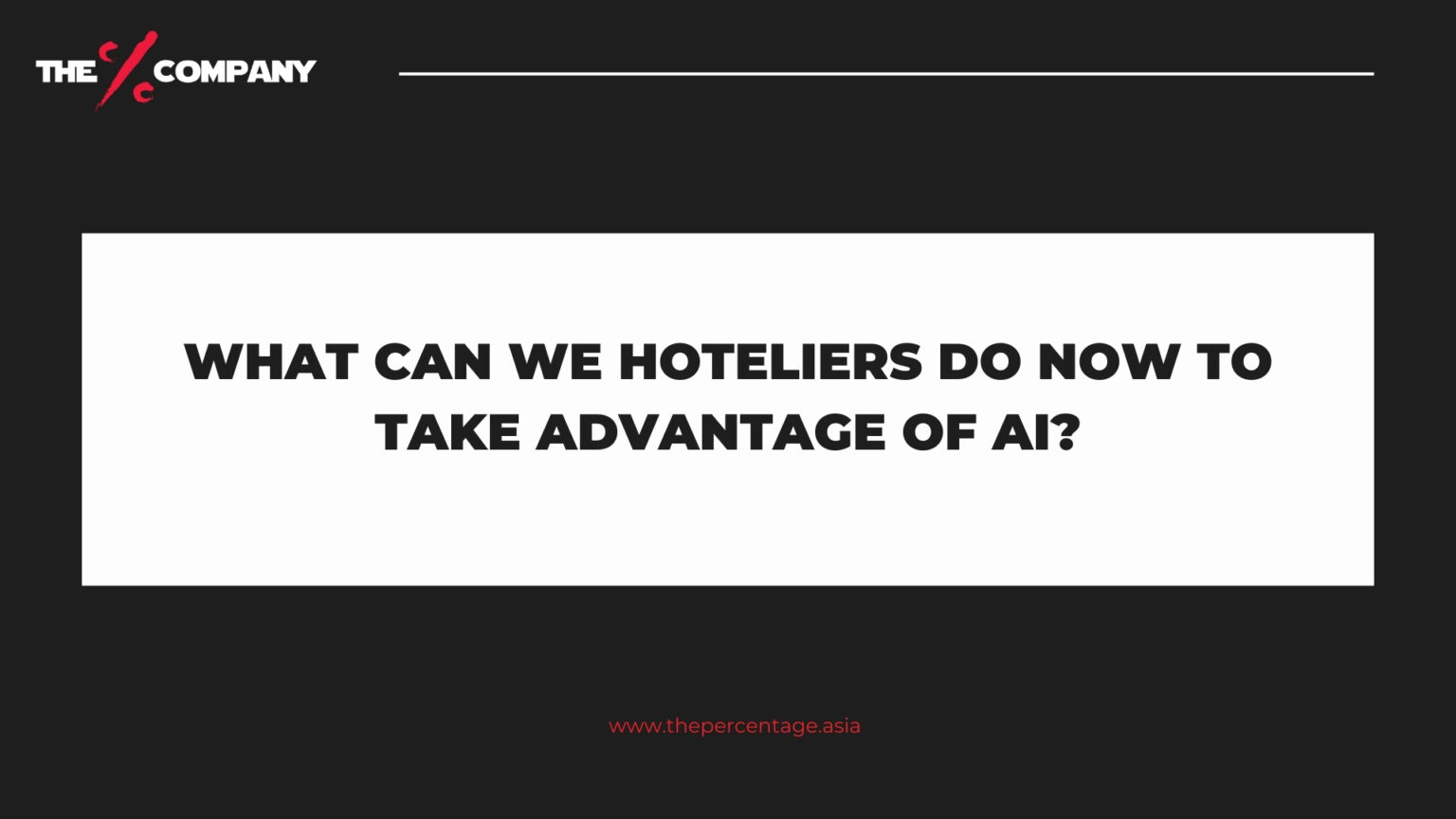
What can we hoteliers do now to take advantage of AI?
So what can we do now? As mentioned, by embracing AI, we can not only enhance the guest experience but also improve the efficiency of our operational structures and drive profitability.
Let’s have a quick look at what some of the other industry leaders are doing in this space…
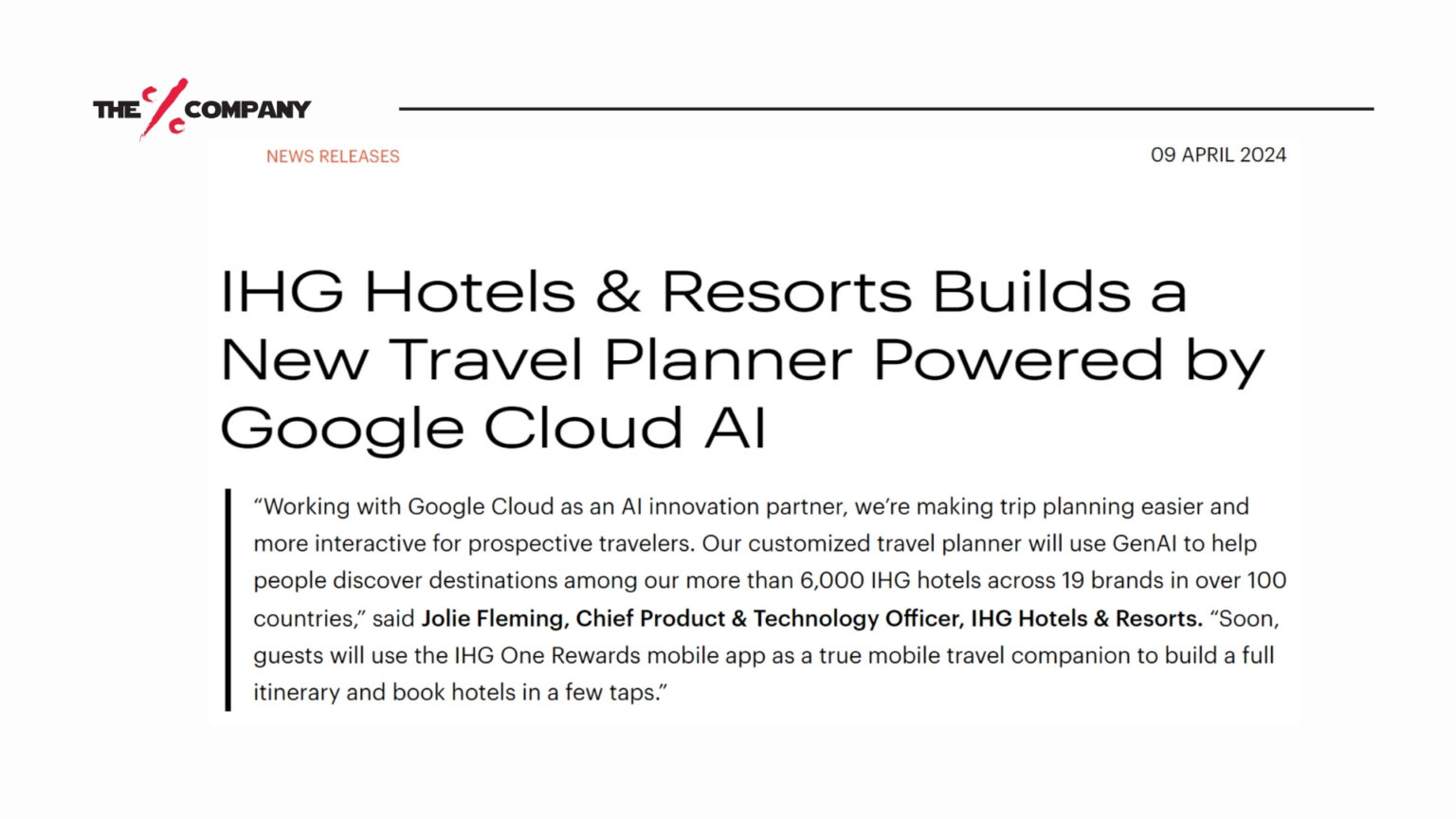
IHG are building an AI driven travel planner integrated into their rewards program
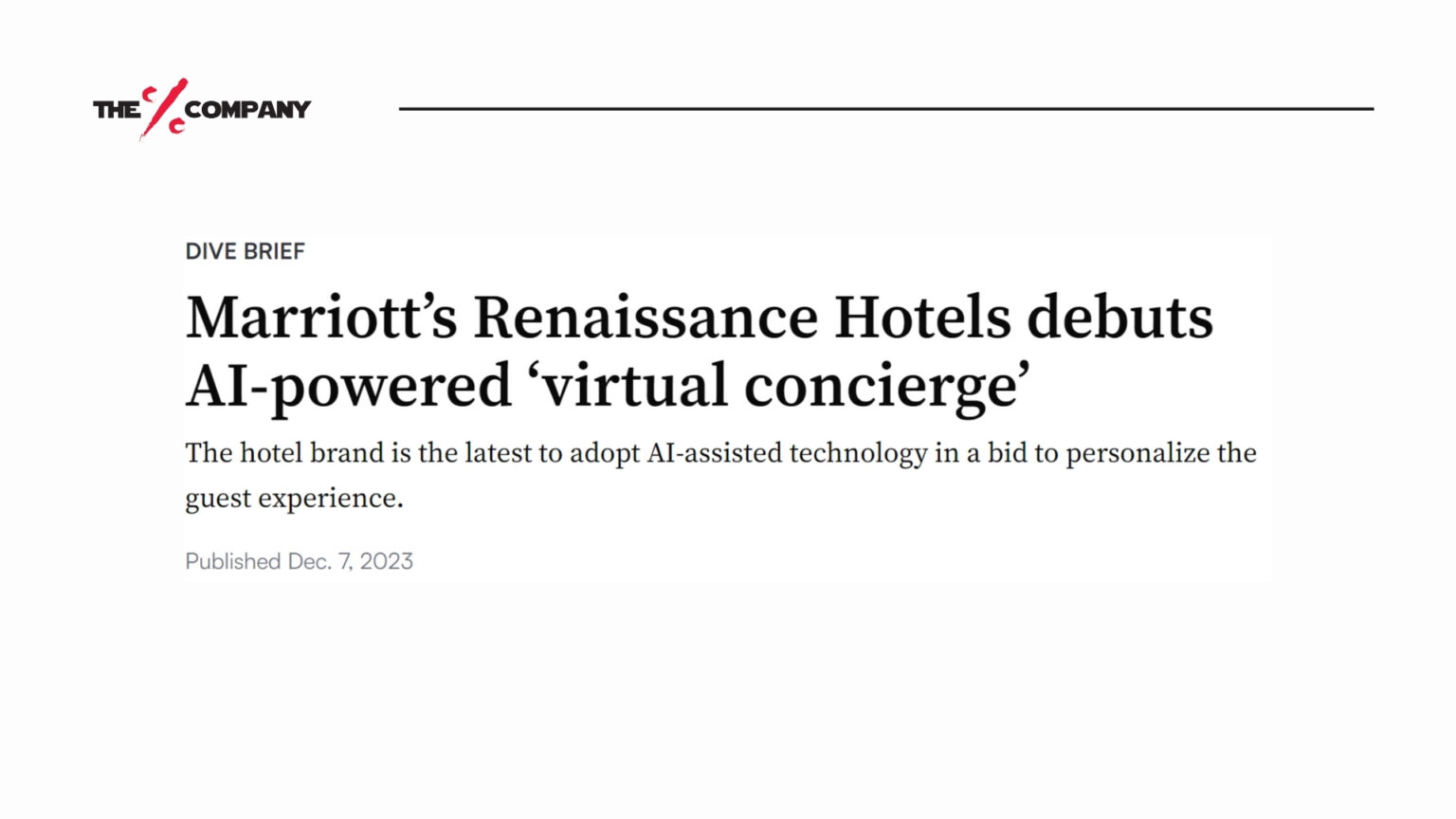
Marriott’s building a virtual concierge to help personalize the guest experience.
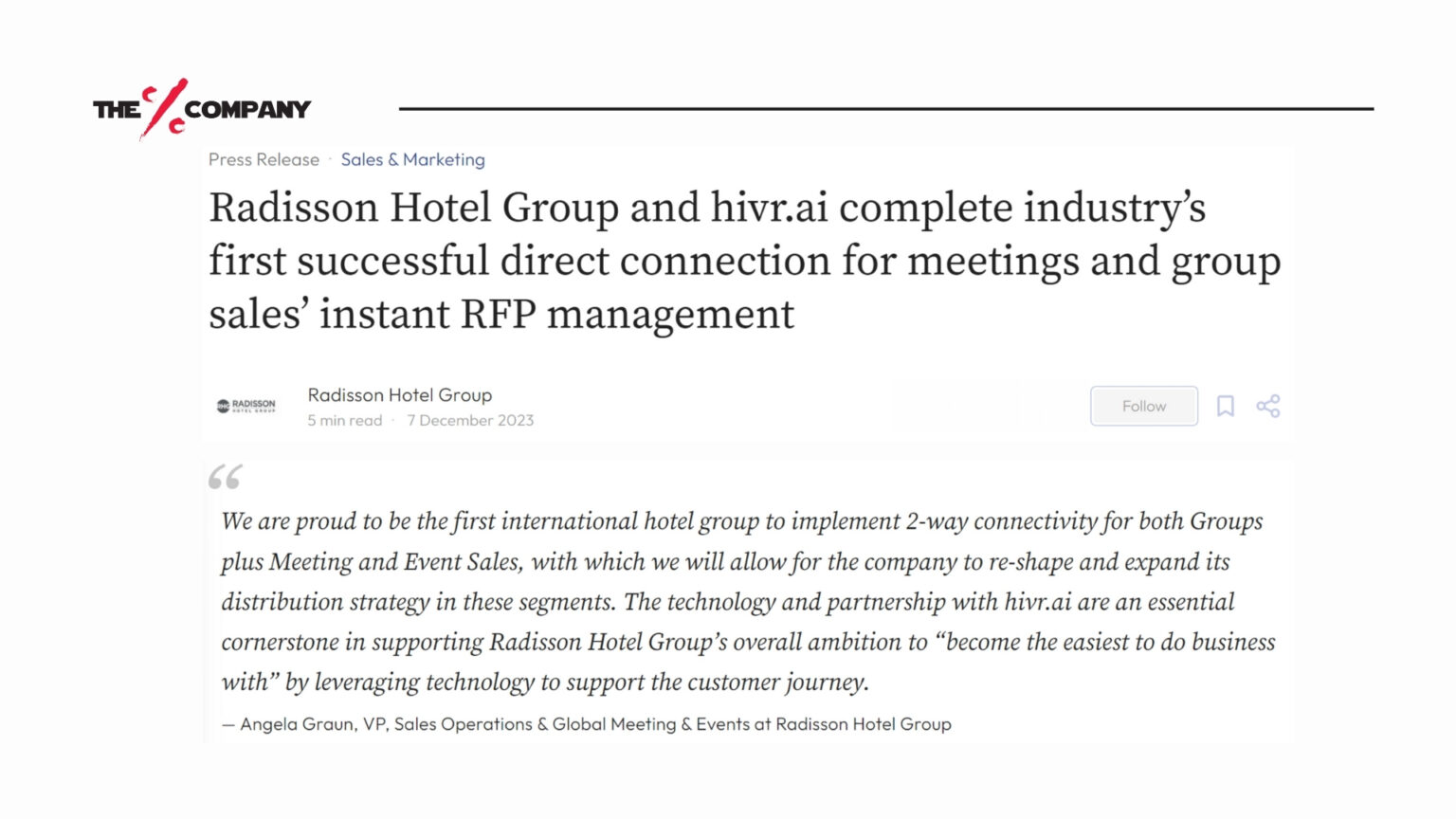
Radisson are partnering with hivr.ai to develop an AI driven MICE solution
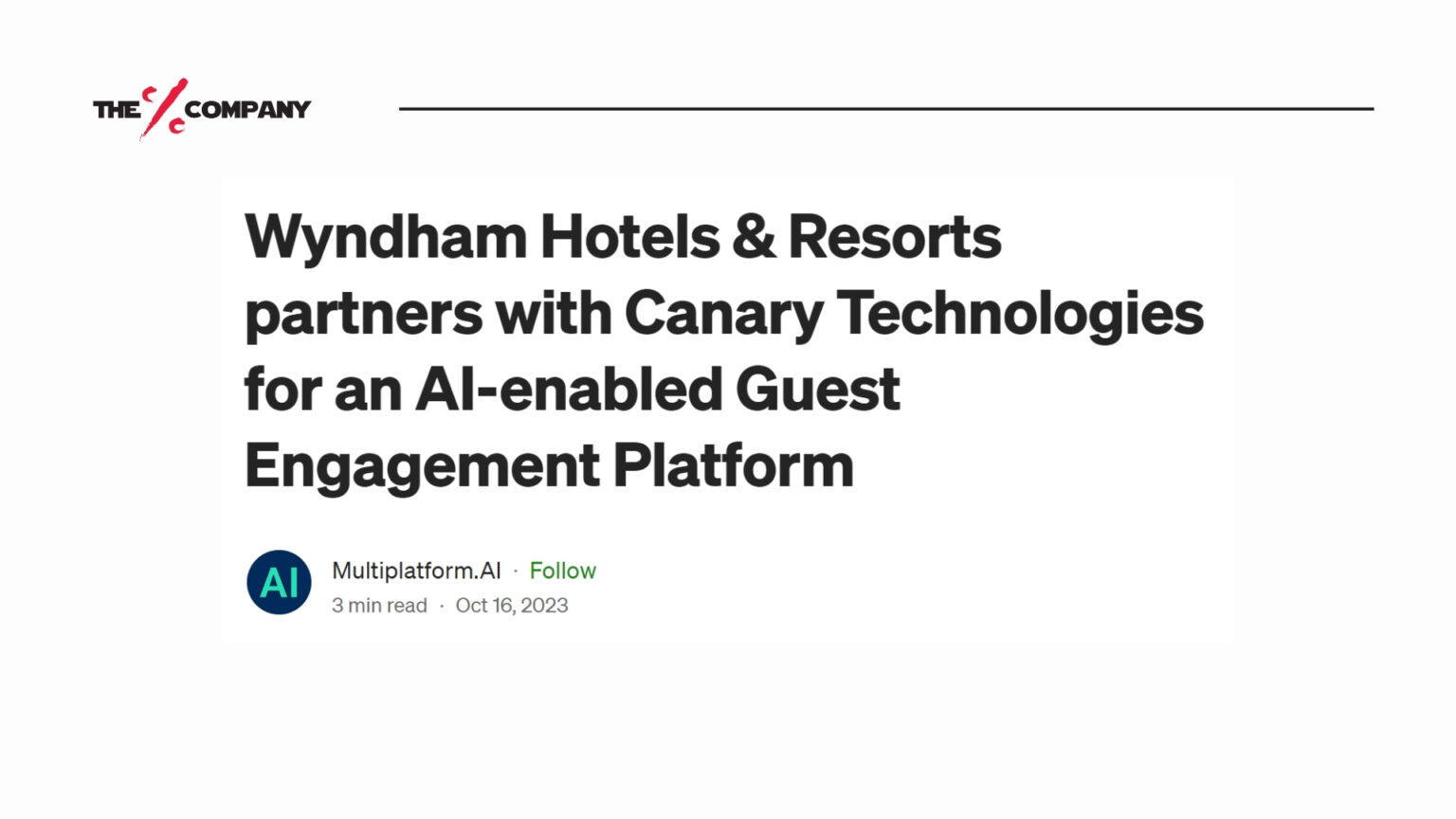
Wyndham is partnering with Canary Tech to develop an AI guest engagement platform.
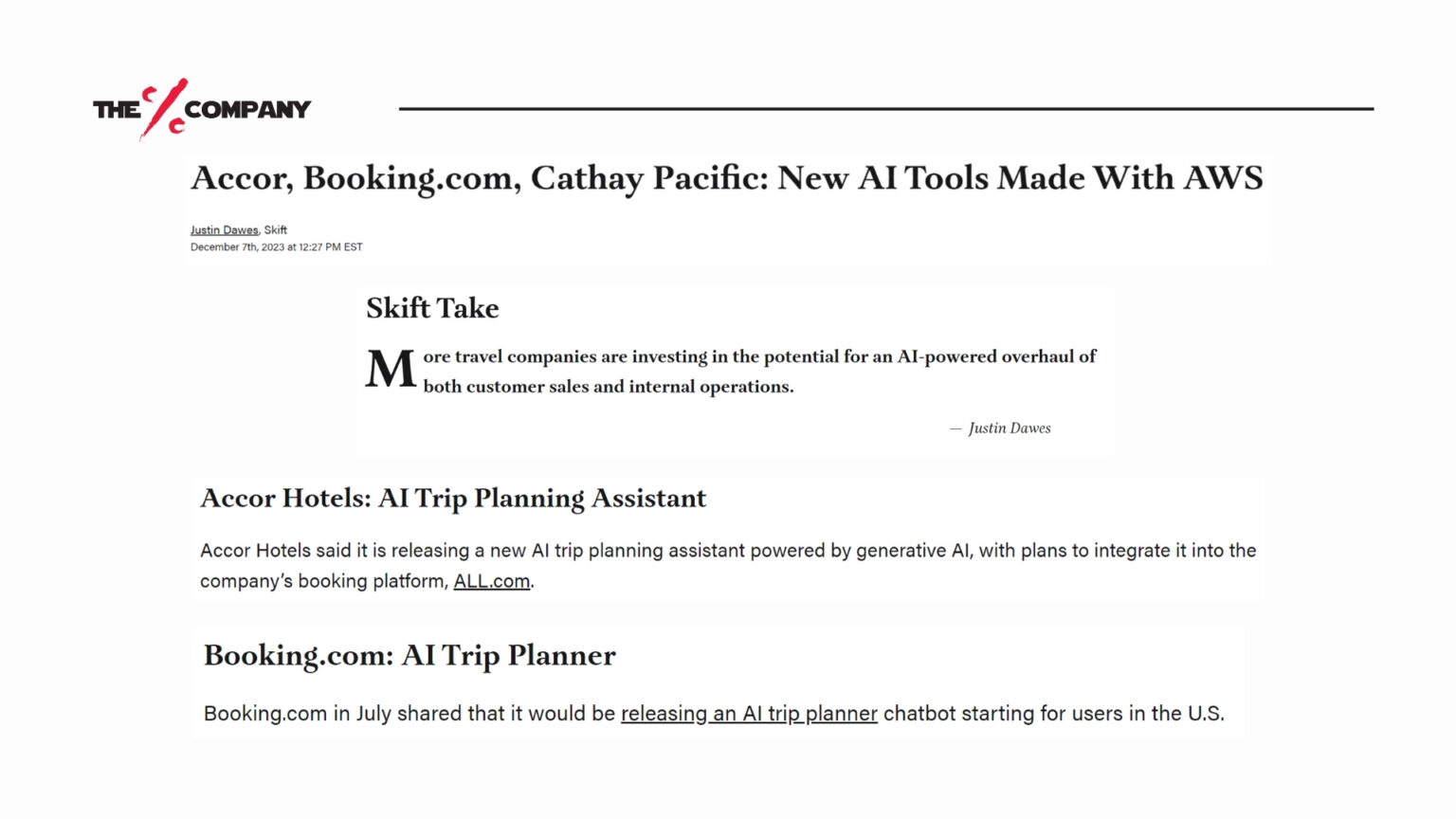
Accor is building an AI planning Assistant, Booking.com are building an AI trip planner and even Cathay Pacific are getting in on AI.
Jonathan Davies of Skift says: “More travel companies are investing in the potential for an AI-powered overhaul of both customer sales and internal operations”.
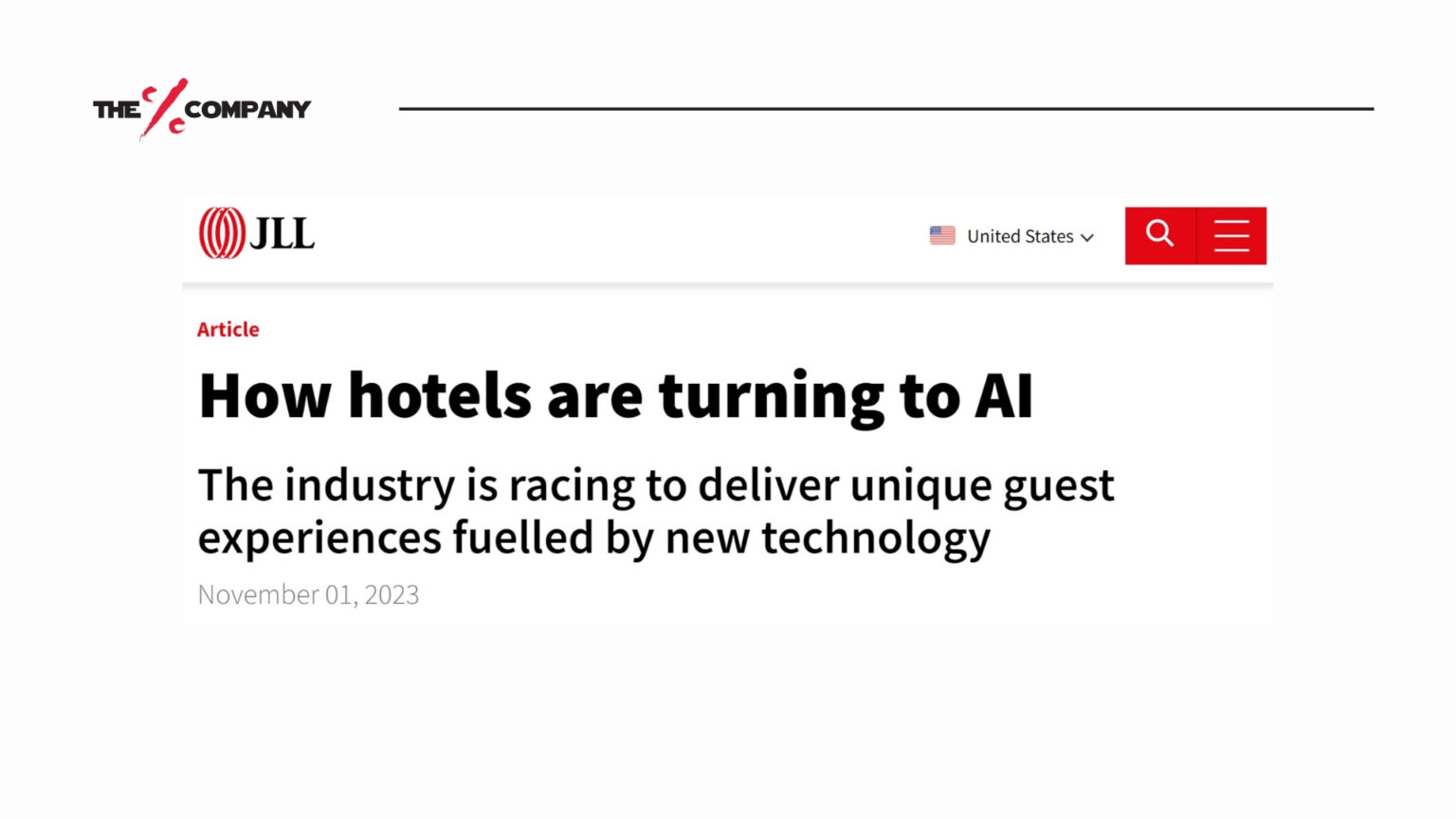
Even JLL indicates that there is a market-wide rush to deliver AI solutions.
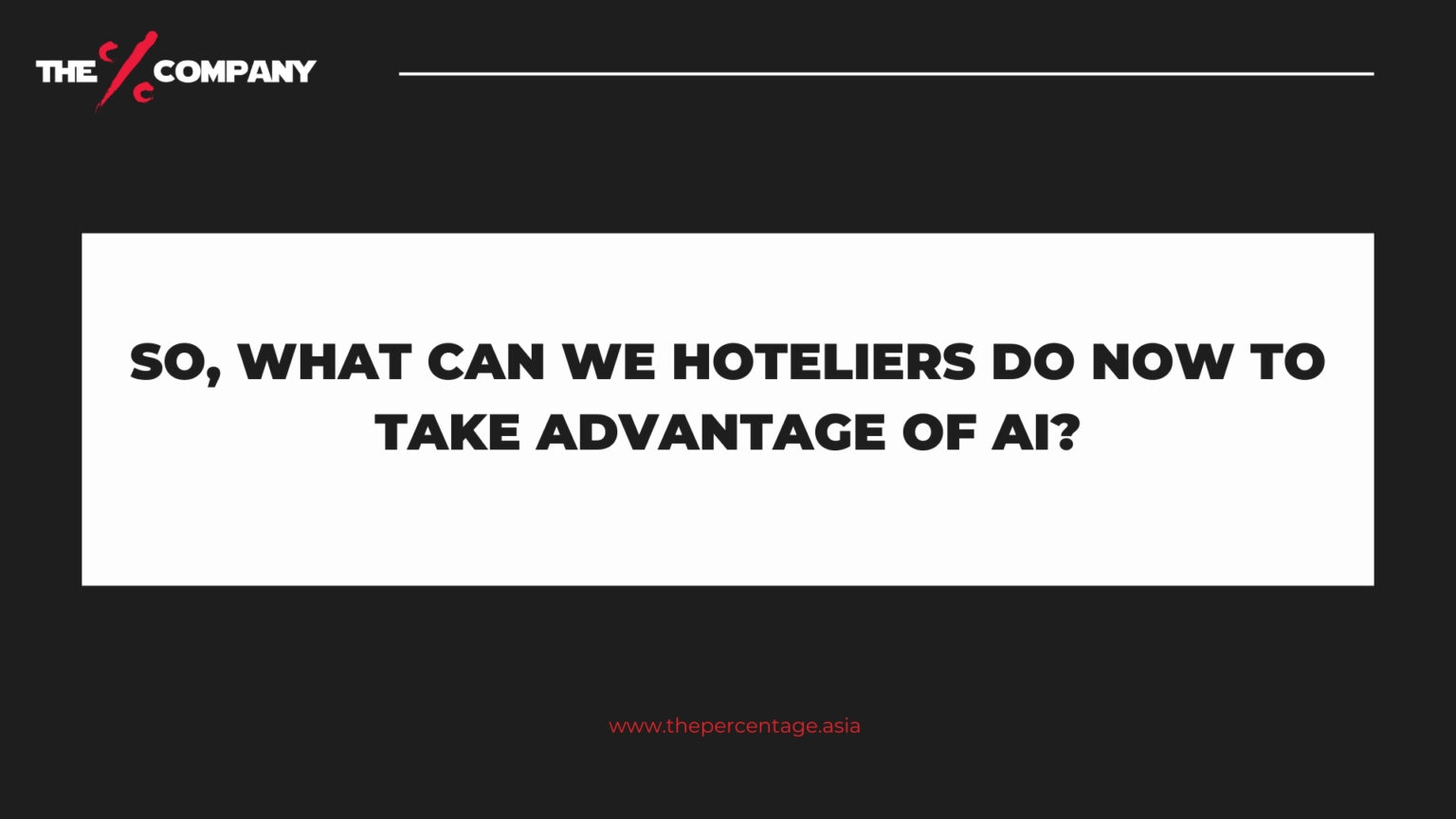
With AI still in its infancy, the Return on Investment calculation may not be great at the moment, introducing additional unwelcome costs to your operation, but ROI stands for more than just RETURN ON INVESTMENT in this case, it also stands for … Risk Of Inaction
From a risk vs reward perspective, it’s better to jump in now and face the risk of being wrong, than deal with becoming obsolete further down the line.
AI is a high-value, long-term investment to future-proof your organization and in this ever more competitive market, can be a competitive advantage for early adopters or a competitive disadvantage if you are left behind.
So, here’s some of my top high-level tips and proactive steps that can be taken now by your organization to engage with AI:
1. Assess Your Needs
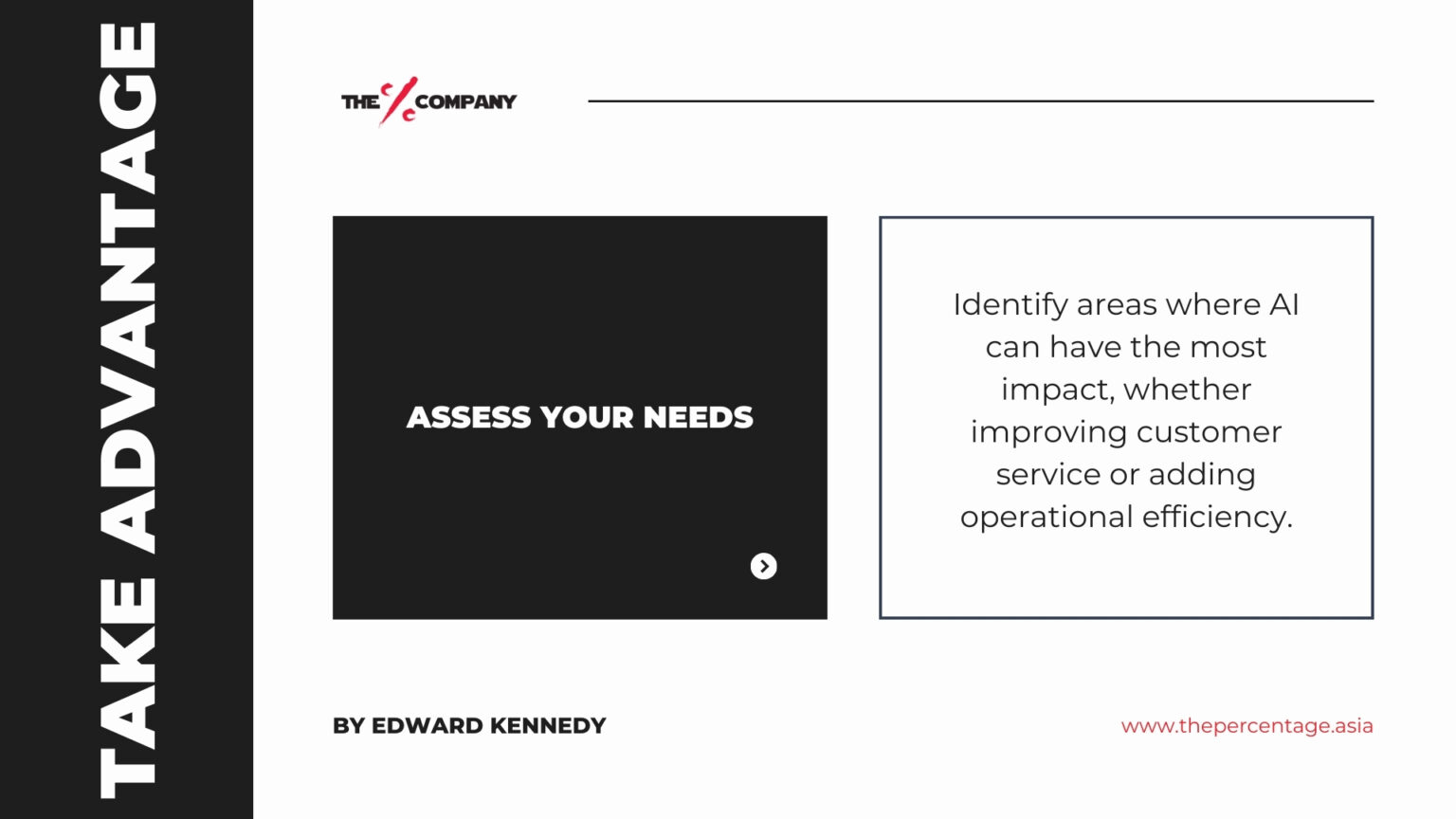
Assess Your Needs & Identify areas where AI can have the most impact, whether it’s improving customer service or adding more efficiency to your operation.
2. Start small
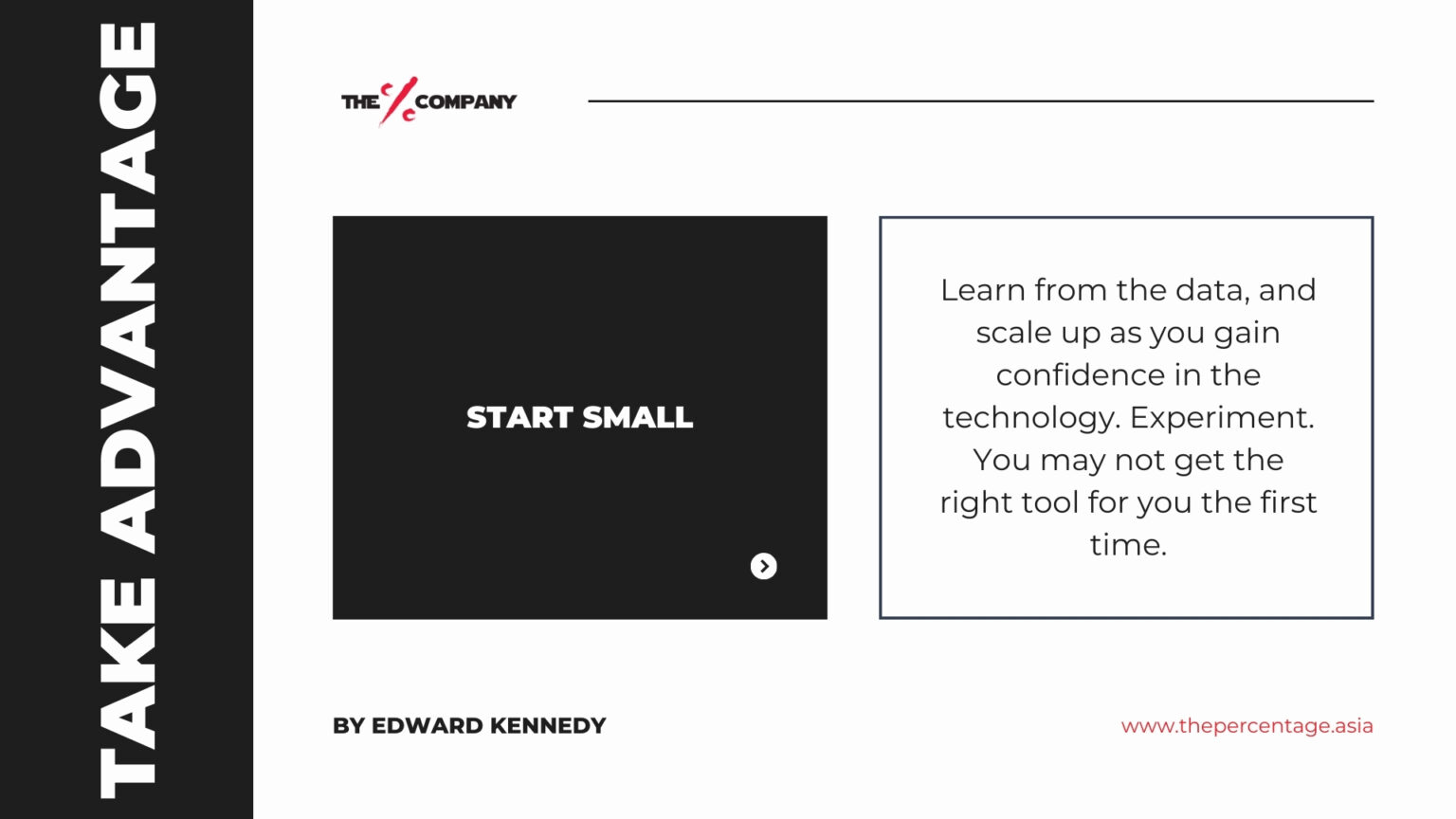
Experiment but start small. Learn from the data, and scale up as you gain confidence in the technology. Experiment with a single hospitality focused AI application, like a chatbot, virtual concierge, smart room feature, analytics platform or dynamic pricing tool and measure its effectiveness before scaling up. You may not get the right tool the first time, expect to make mistakes.
3. Train your team
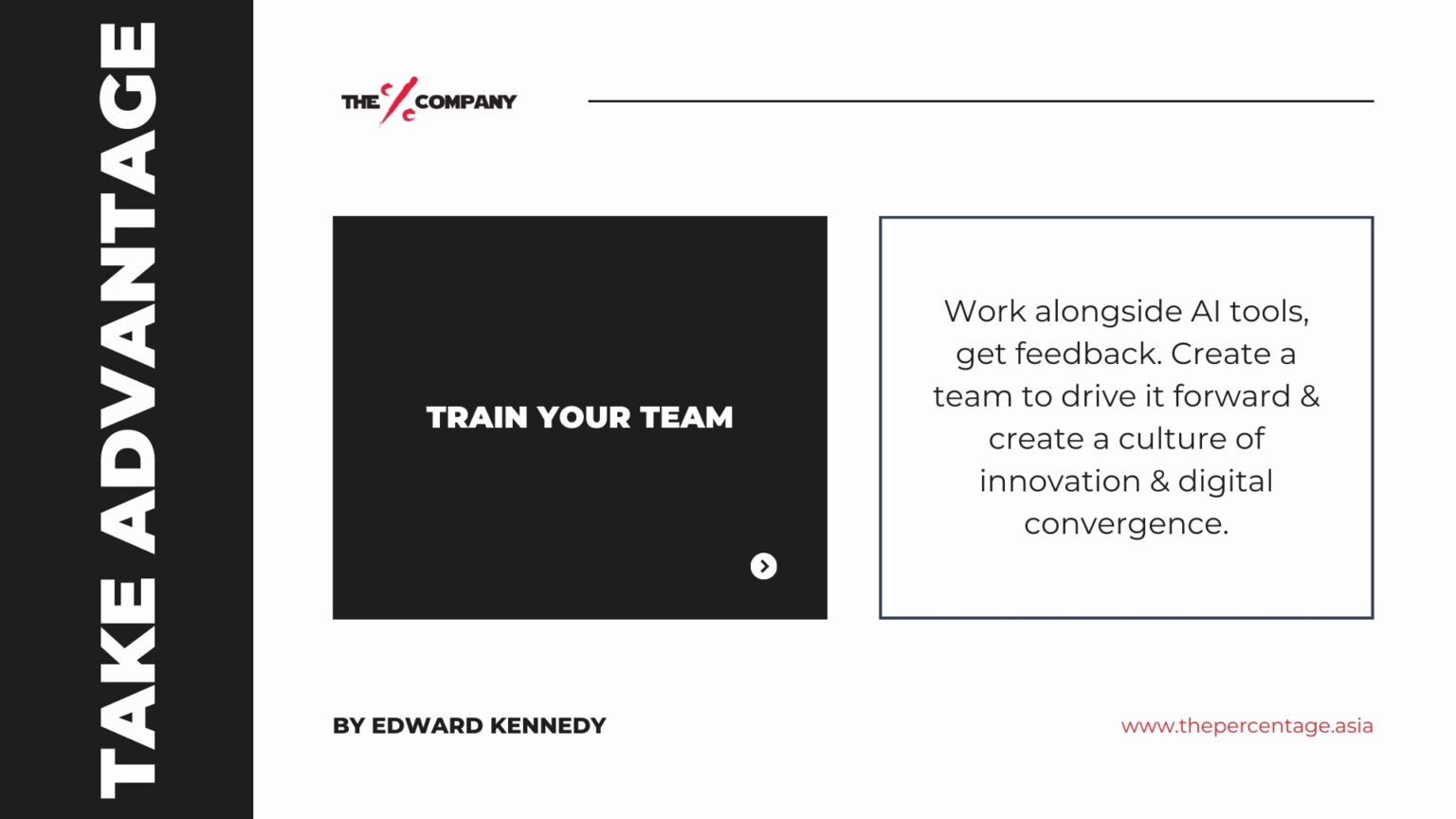
Acquire new talent & train your team to work alongside AI tools and ask for their feedback for improvements. For any AI strategy to take off, you need a team that will drive it forward and make it happen. Try to foster a culture of innovation and digital transformation and incentivize creativity and collaboration across departments. In the longer term, our focus must shift to reskilling, upskilling & multi-tasking for those roles that are most likely to be impacted.
4. Gather data
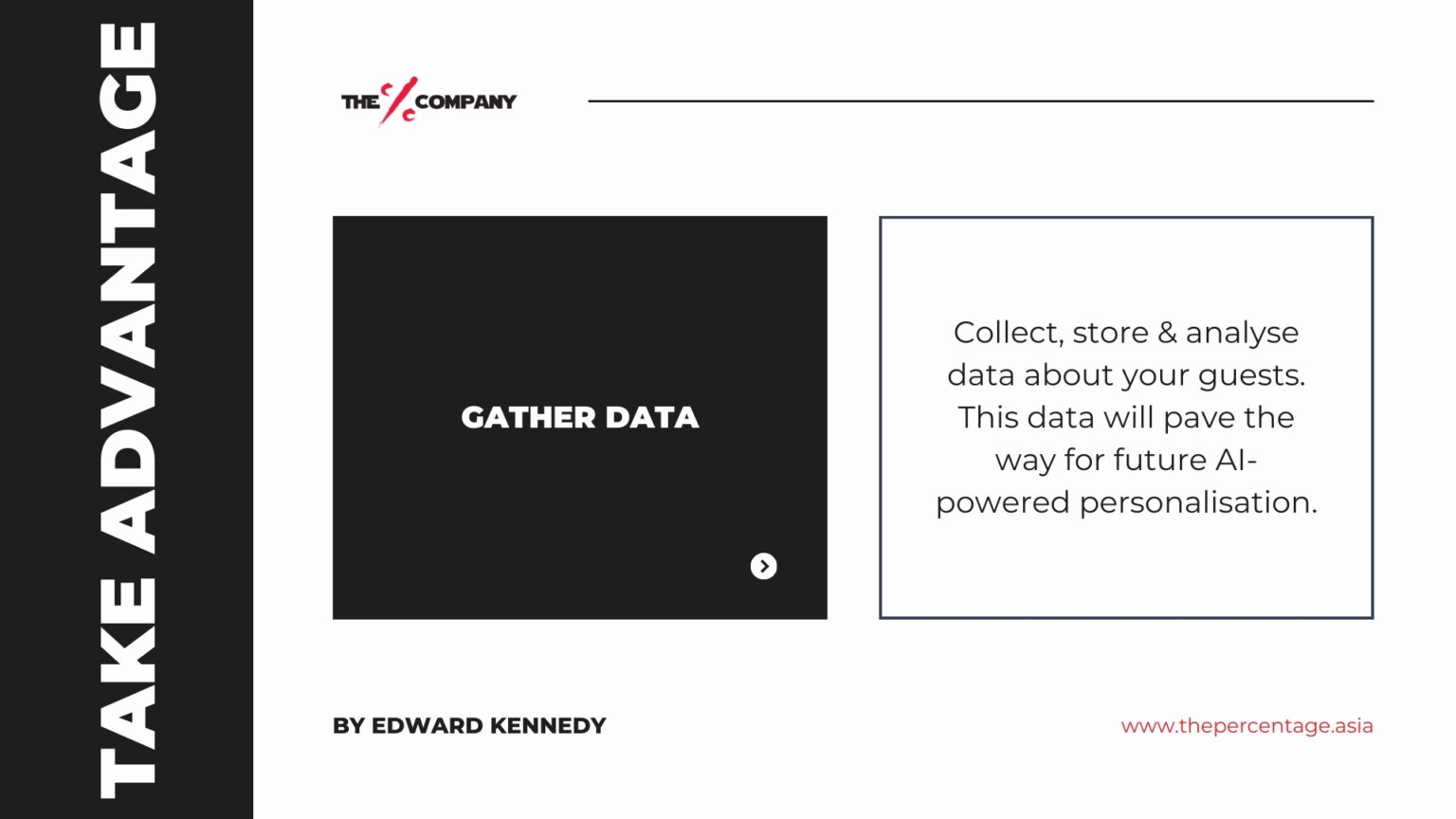
Destroy Silos & Gather Data which can then be used to refine your AI systems and improve guest experiences. Start collecting and storing your guests preferences – such as what amenities they use, the type of room they typically book, and the activities they enjoy during their stay. This data will pave the way for future AI powered personalization.
5. Stay informed
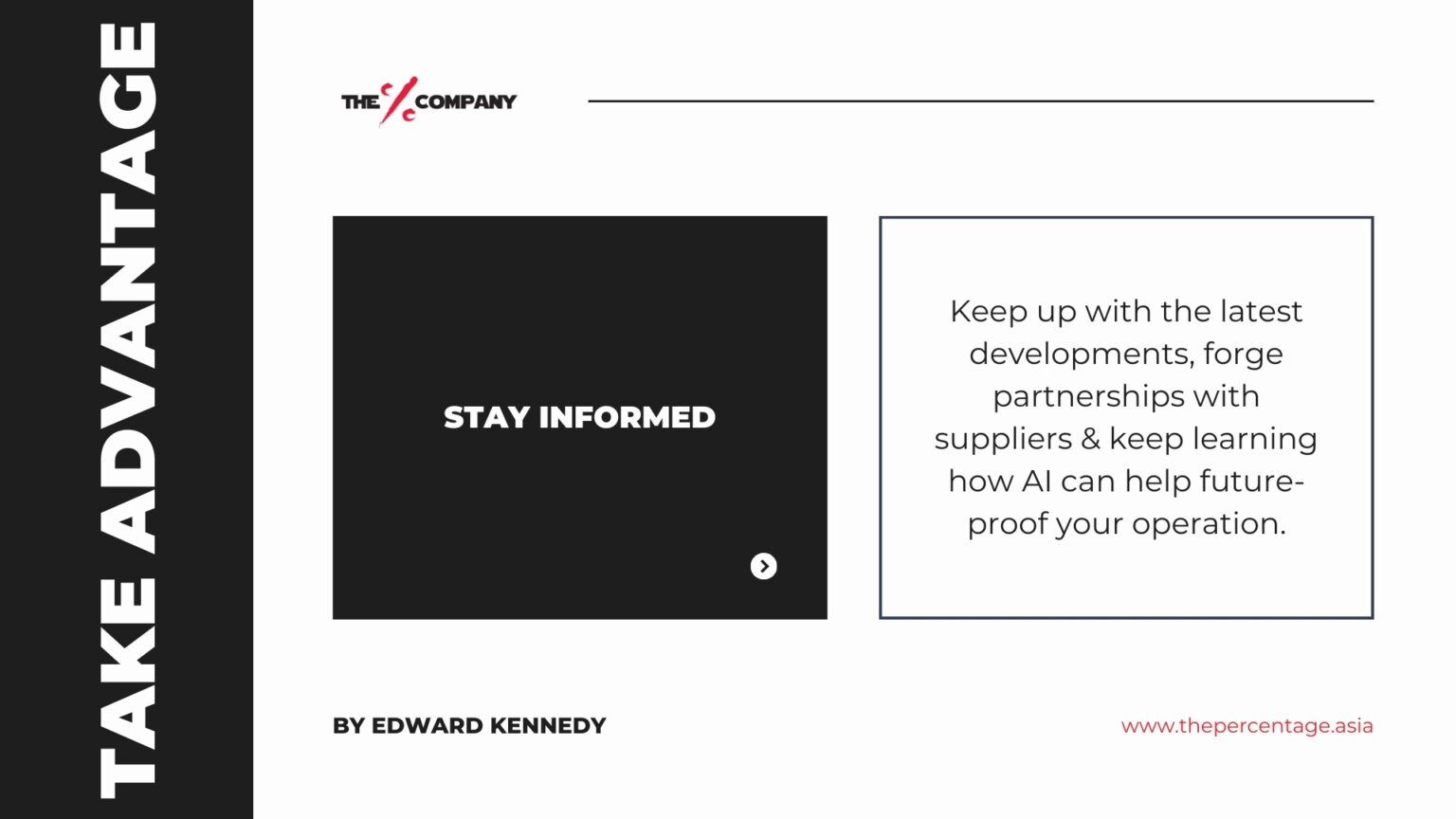
Stay Informed & Keep up with the latest AI developments and consider how they can be applied to your hotel to future-proof your operation. Forge strategic partnerships with AI vendors, tech providers and industry experts and leverage external resources and networks to ensure that you stay on top of all the latest AI trends and best practices.
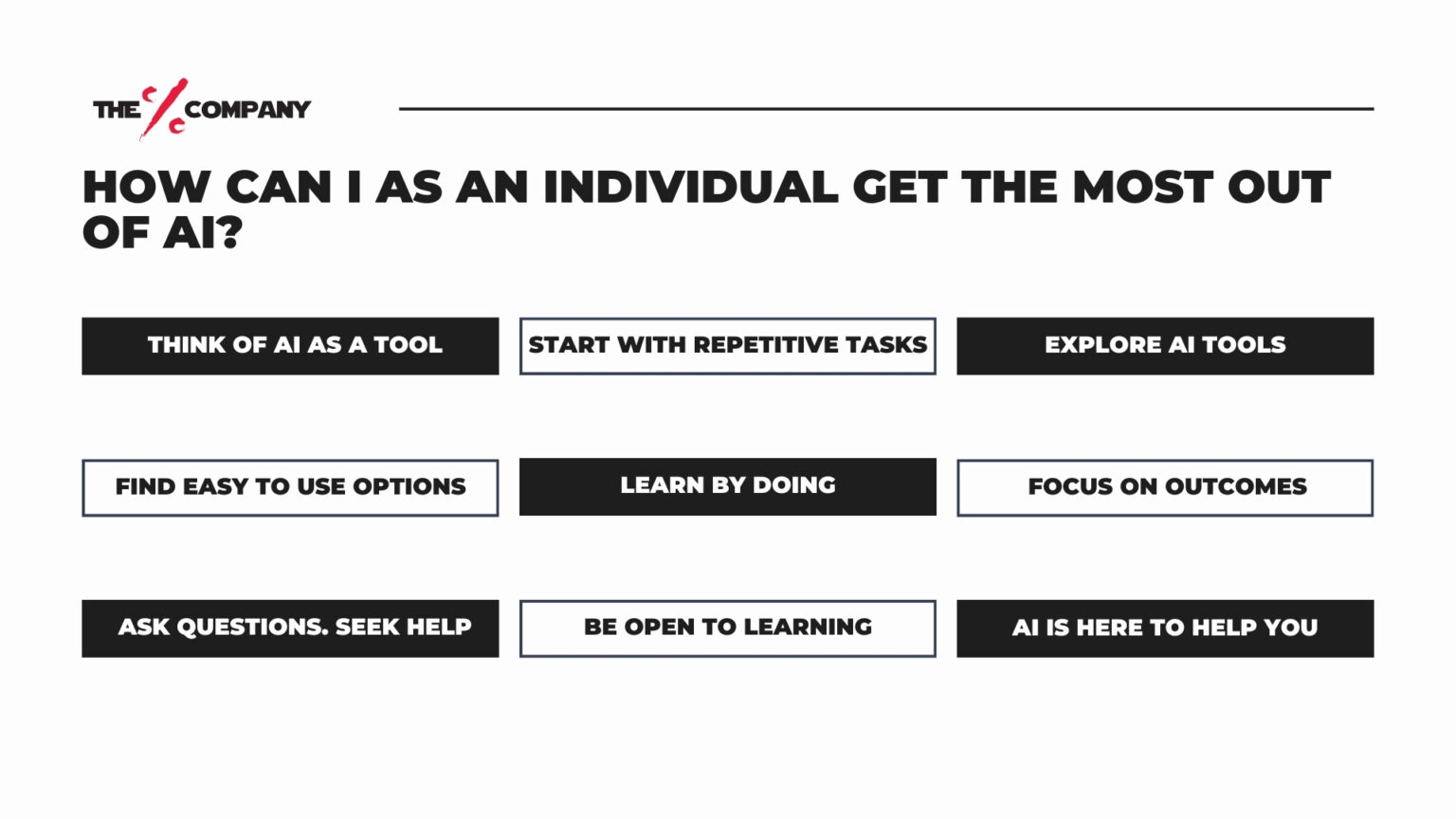
How can I as an individual get the most out of AI?
Some of what I just mentioned would apply to you as an individual also, but here are some more tips for how you as an individual can get the most out of AI?
- Think of AI as a Tool: Imagine AI just as a software to enhance your work. It won’t replace you, but it can automate tasks and free you up for more strategic or creative work.
- Start with what you already do: Identify repetitive tasks in your daily routine from writing emails to checking documents to sorting data.
- Explore Available AI tools: Many companies and organizations already use AI. Start with integrating Google Gemini, ChatGPT or Microsoft CoPilot into your daily routine.
- Focus on User-friendly options: There are lots of AI-powered apps and services designed for ease of use. Explore options with clear interfaces and tutorials.
- Learn by Doing: Don’t be afraid to experiment! Most AI tools have user guides and practice modes. Play around, get comfortable with the functionalities, and see how they can benefit you.
- Focus on the Outcome: How can AI help you achieve your goals? Can it improve your work accuracy, efficiency, or free up time for more analytical tasks? But remember, don’t just rely on the outputs, human experience is key.
- Ask Questions and Seek Help: Don’t hesitate to ask colleagues or IT support for guidance on using AI tools effectively.
- Be Open to Learning: The field of AI is constantly evolving. Be open to change, stay curious and embrace opportunities to learn new skills and functionalities as AI continues to develop.
Remember, AI is there to Assist: Don’t feel pressured to become an AI expert. The goal is to leverage AI’s capabilities to improve your work and become more productive.
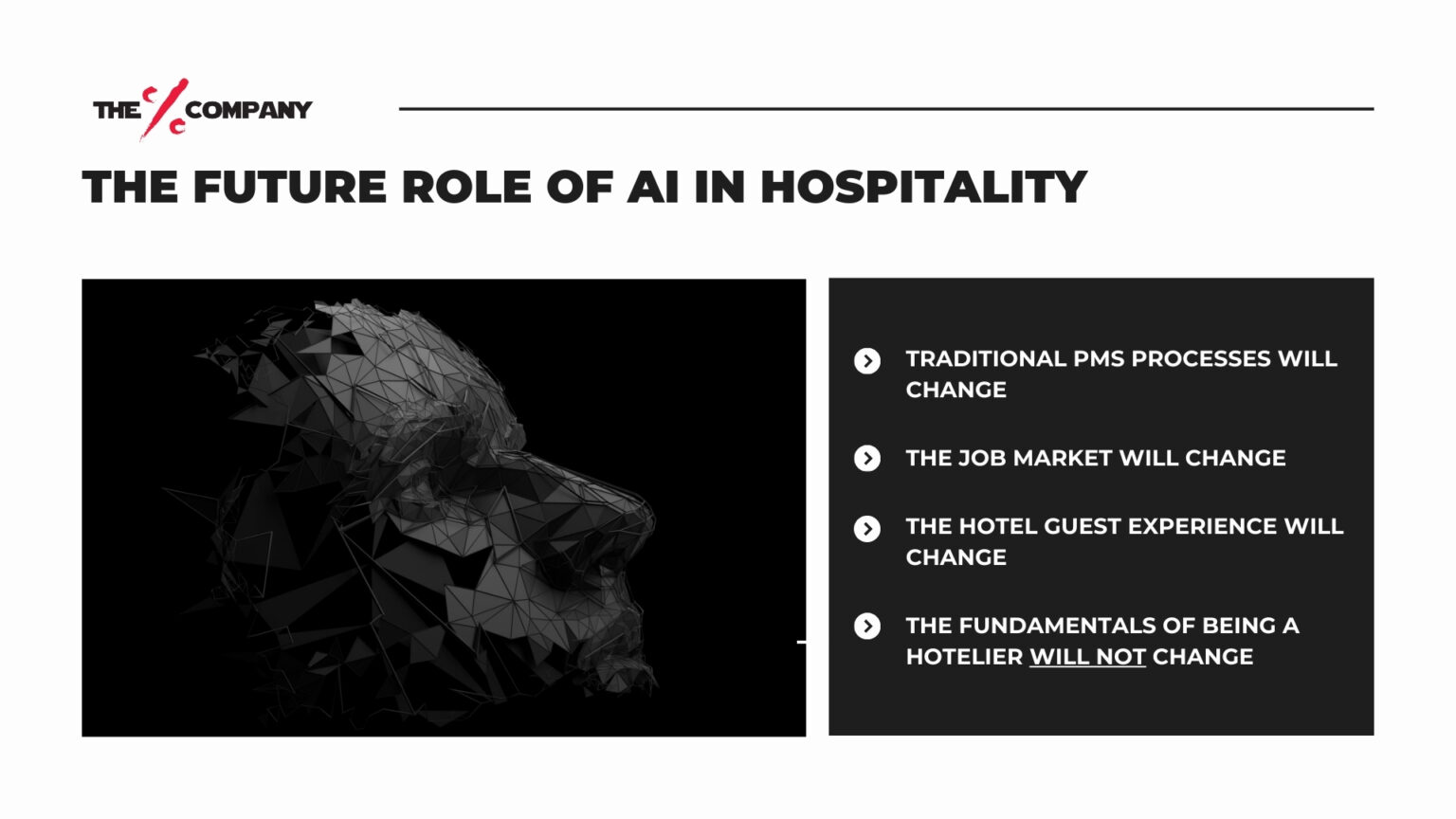
The future role of AI in hospitality
So what’s the future of AI in the hospitality industry going to look like? Depending on who you talk to, AI is either the savior of the human race, the end of the human race or something in-between, but if i break out my crystal ball, I would say one thing is clear, we can expect widespread adoption of AI across finance, healthcare, manufacturing and yes, hospitality and it will become significantly more capable and sophisticated over the next 5 years.
- Traditional PMS processes will change. Tech stacks with more unified control over data with API are most likely to be best positioned going forward. The hotel of the future will need full access to all its data to leverage AI effectively. PMS that fail to adapt, will likely decline. A new space-race of software interoperability is beginning and the systems which allow more access to the data via APIs, will likely gain more market share.
- The Job market will change. This is unavoidable and there will be extensive automation of tasks going forward, but in practice, this just means that our teams will be able to focus on what really matters: the guests’ needs, creating a more fulfilled workforce by getting rid of the mundane, day to day admin work. Technology has been changing the job market since the industrial revolution in the 18th century but the pace of change is now increasing so it’s important to be agile, act now, and re-skill or up-skill colleagues going forward.
- The hotel guest experience will change. From robotics to voice controls to IoT connectivity to immersive experiences and augmented reality, AI will become more capable and more sophisticated. The possibilities for innovation in our sector are endless.
The fundamentals will NOT change. Hospitality will always thrive on human connection and interaction. AI technology can’t replicate genuine care and empathy.
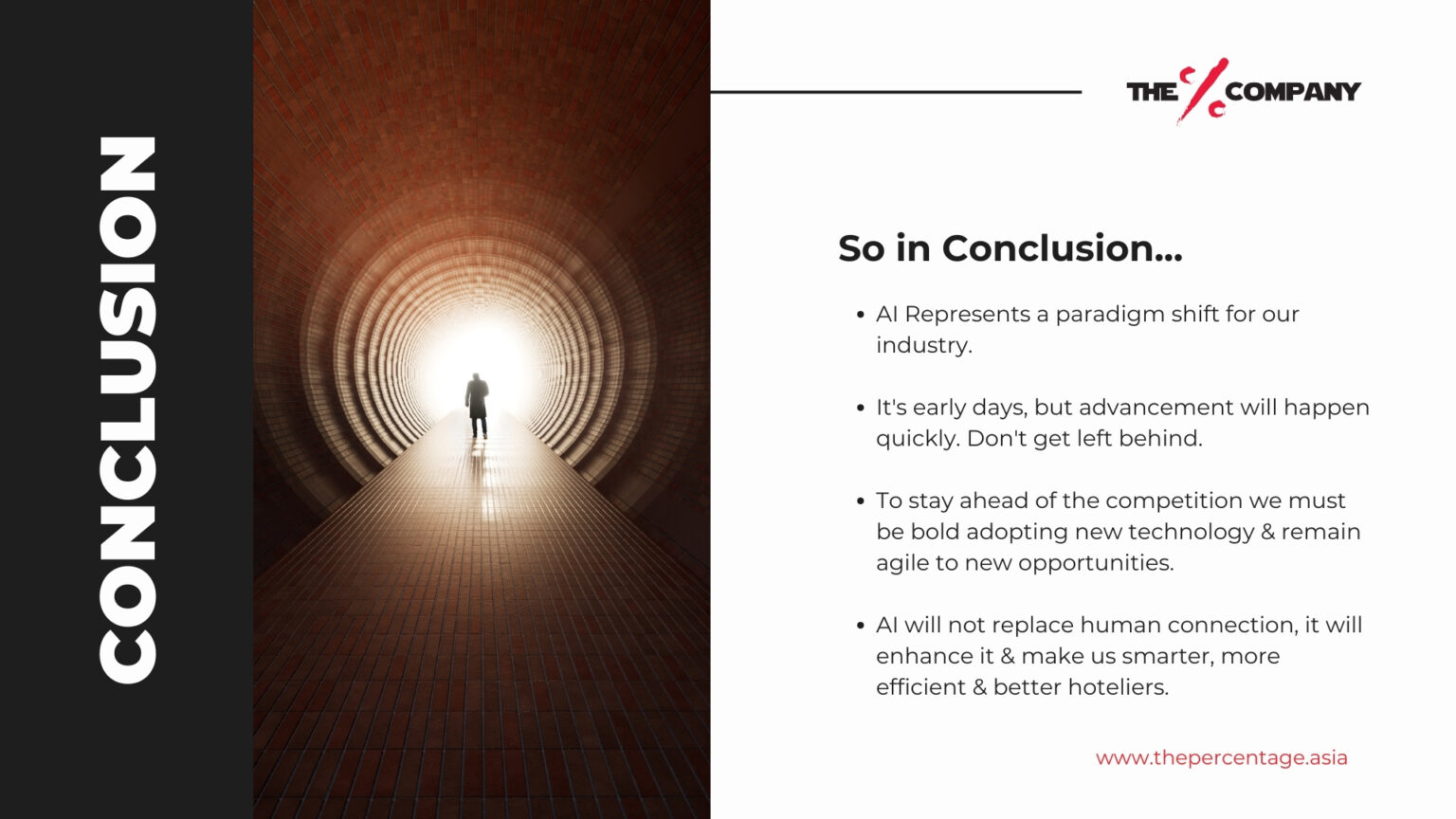
So in conclusion … AI potentially represents a paradigm shift for the global economy. AI is moving extremely fast, but the change will likely be more EVOLUTION than REVOLUTION.
In our industry we are just getting started with a whole new world of possibilities for innovation to keep your hotel profitable and get ahead of the competition. AI has arrived and it’s ready to help you start elevating your creativity and efficiency in small ways each day.
AI is not here to replace the human touch that makes hospitality so special, it’s just a powerful tool to help us be more intelligent, elevate our guests’ experiences, streamline operations, and improve profitability. Artificial intelligence is not a substitute for human intelligence; it is a tool to amplify human creativity and ingenuity.
I would recommend to stay agile, work together and embrace AI now and lead the charge by being proactive and using its capabilities to position your hotels for success in the landscape of tomorrow, with a more efficient, smarter and more guest-centric future.
THANK YOU!
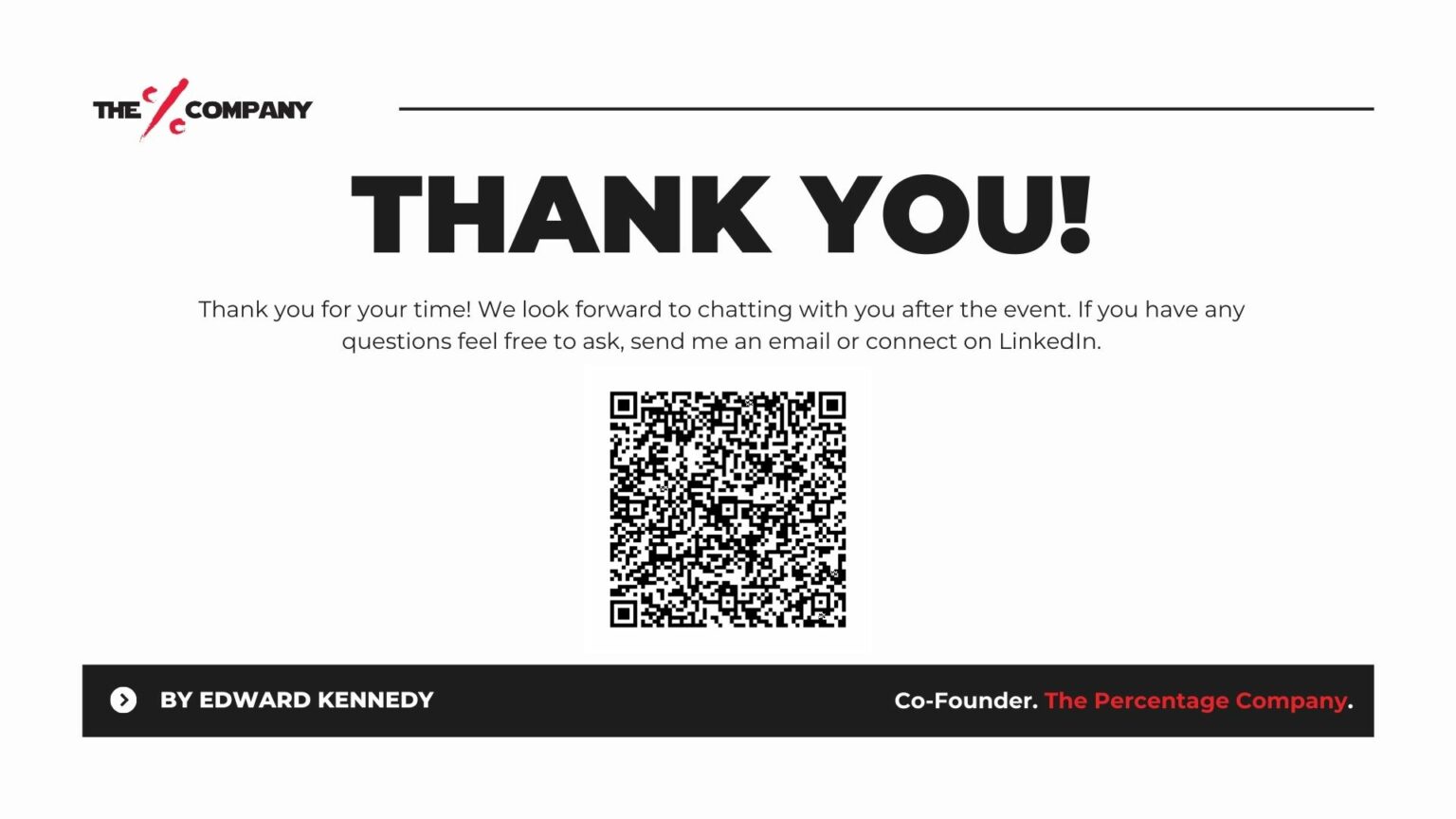
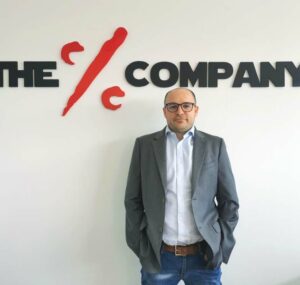
Written By: Edward Kennedy
Co-Founder & Director at The Percentage Company. I started working on websites in 1997 and have been a full-time techie since 2001. I’m committed to leveraging the latest technologies and digital marketing techniques to drive efficiency & improve online sales for our hotel clients. I have a 20+ year track record of success in growing independent hospitality & real estate brands.


